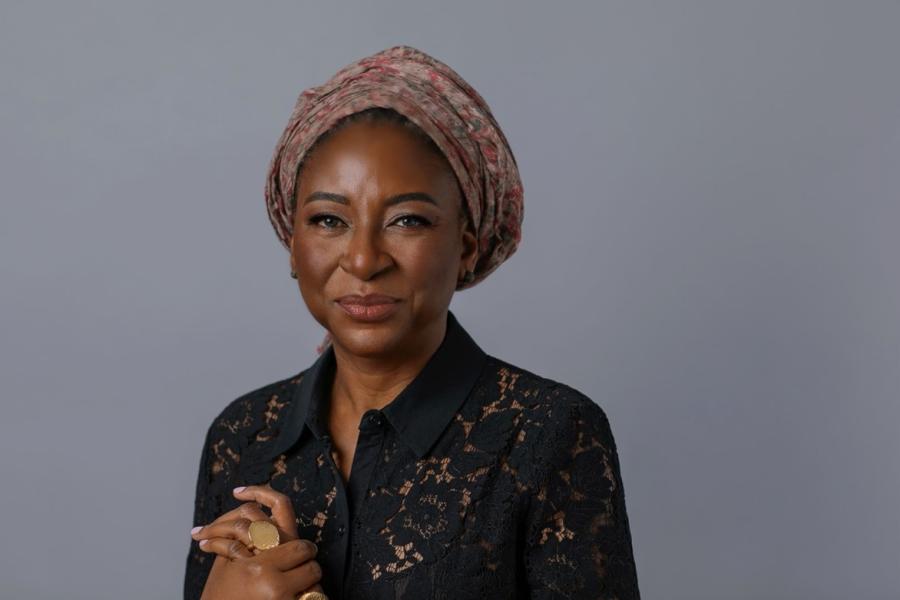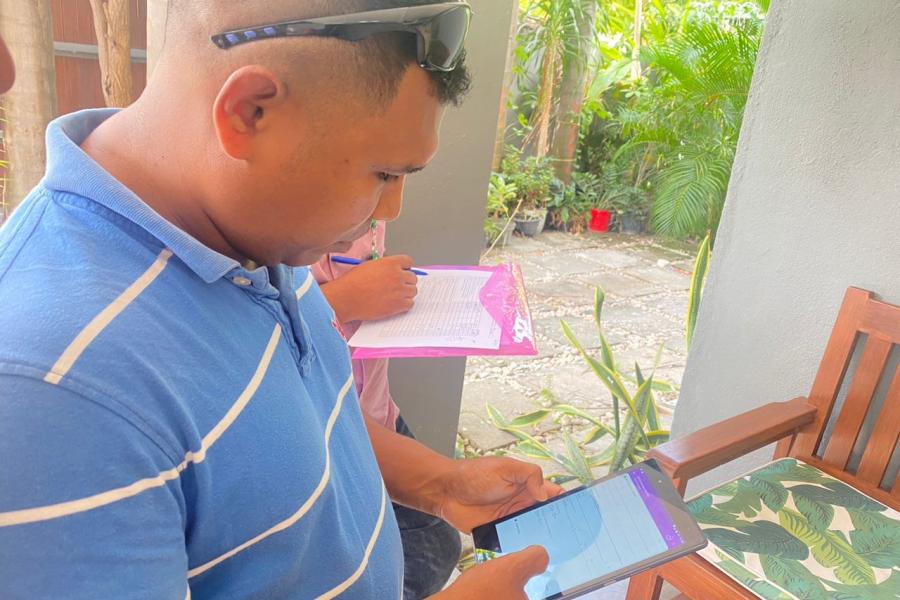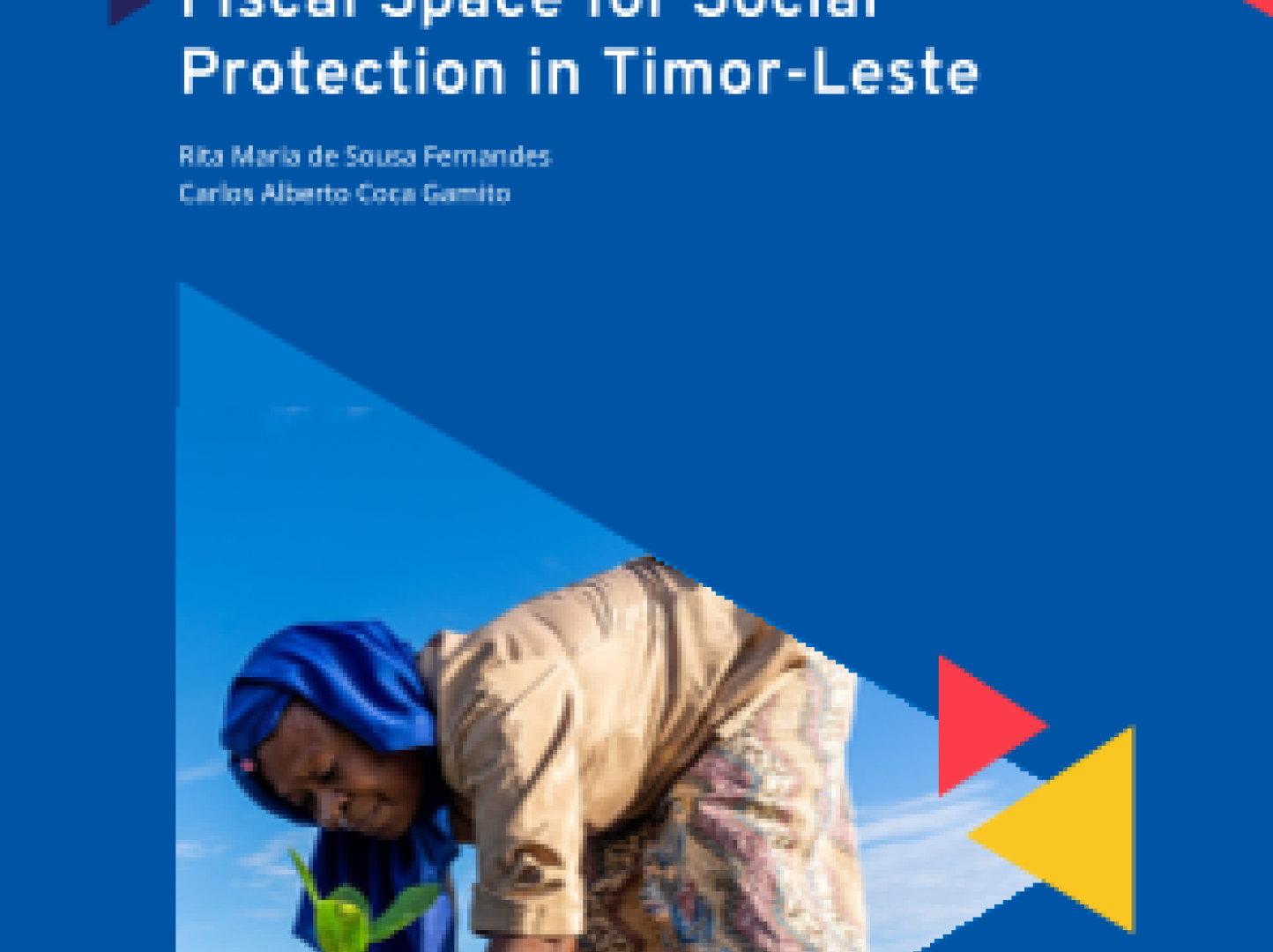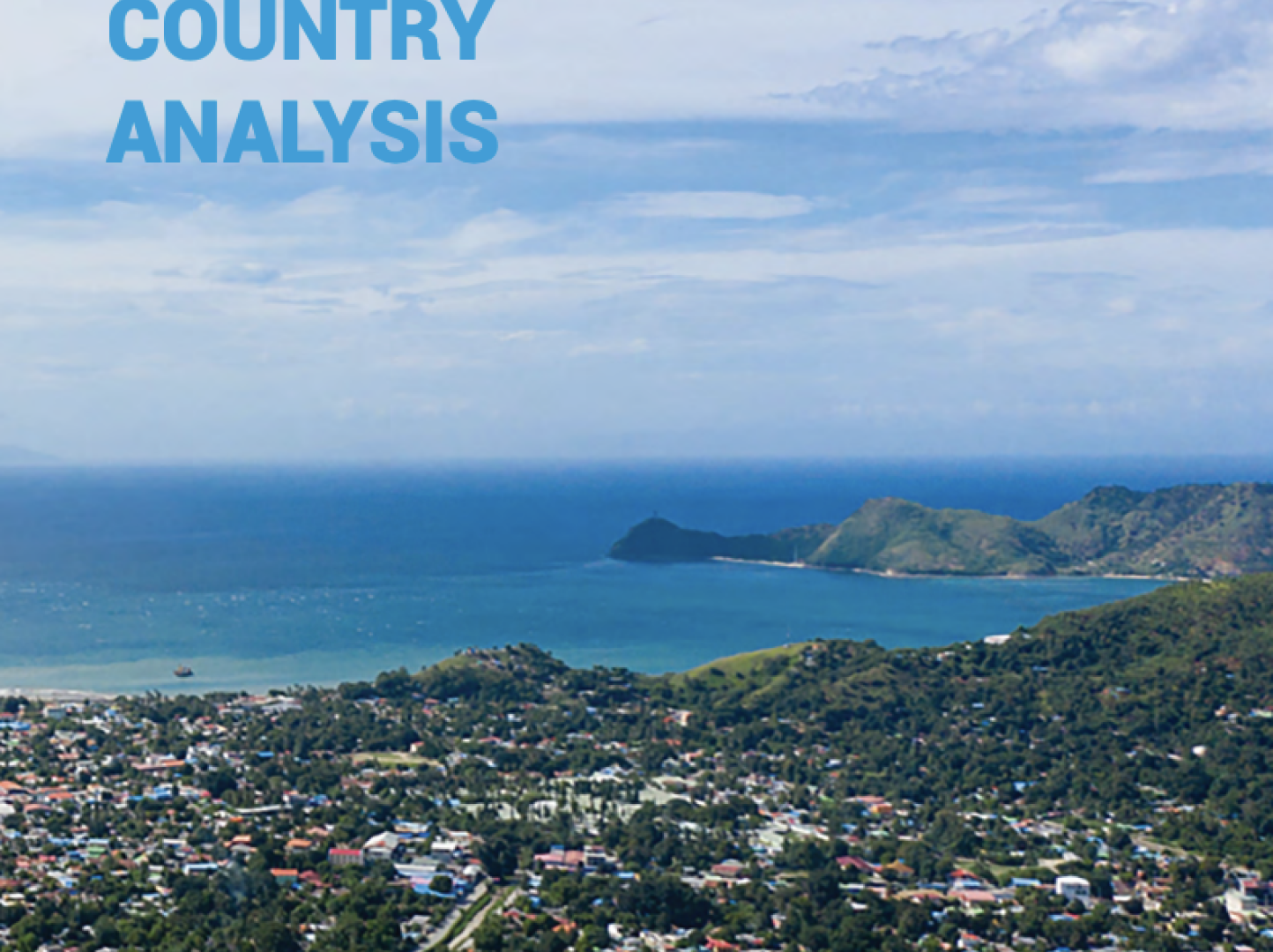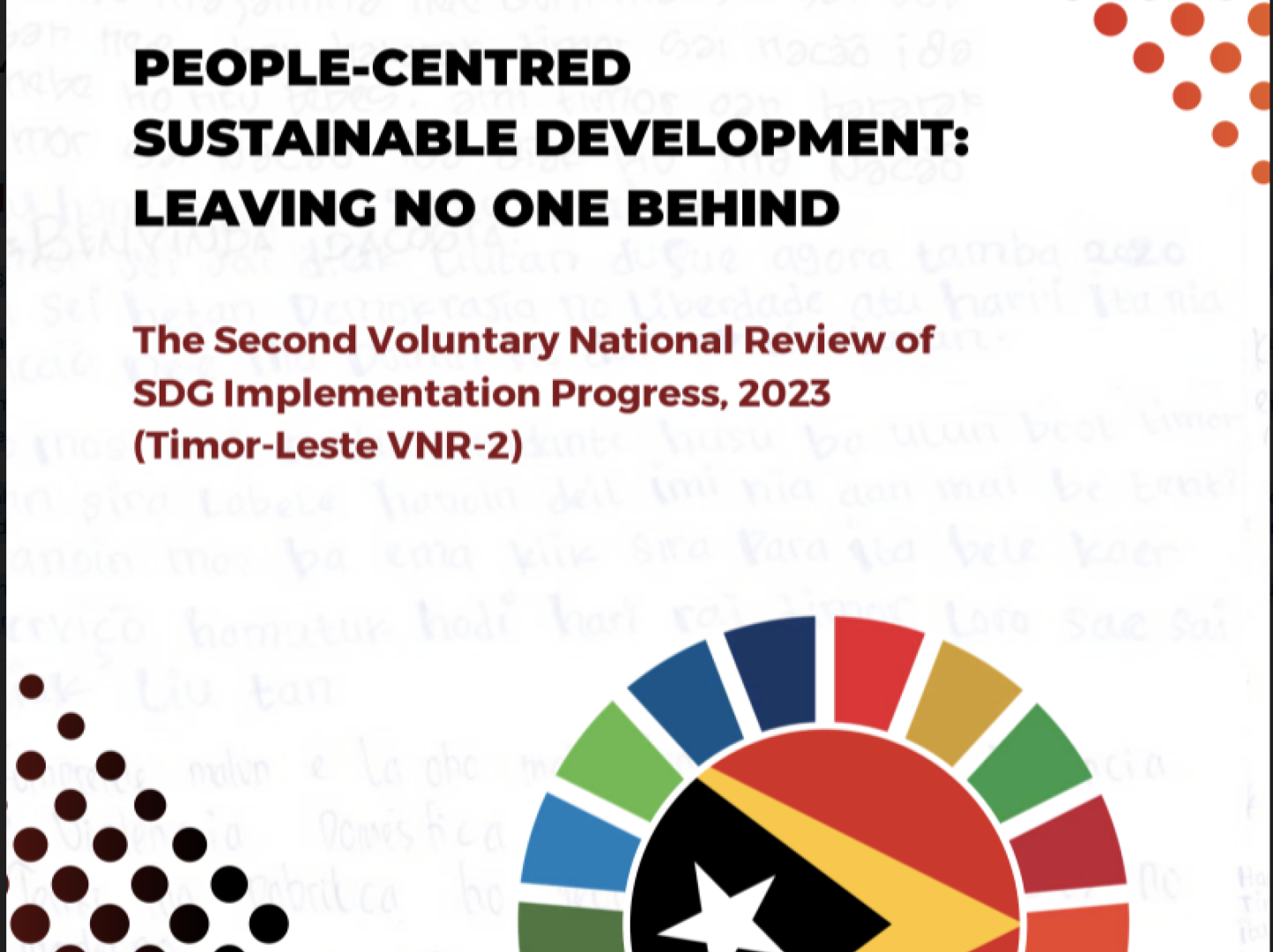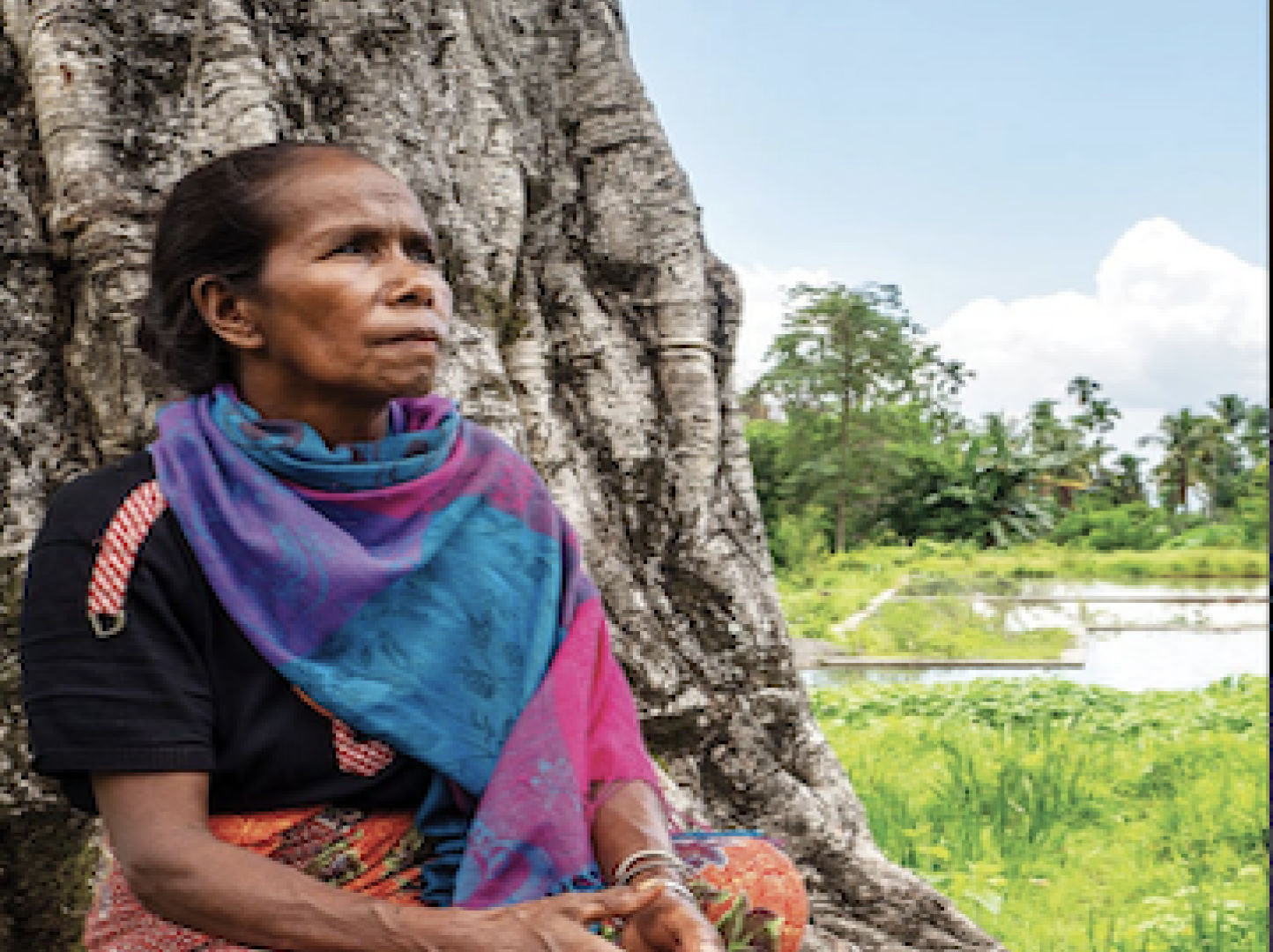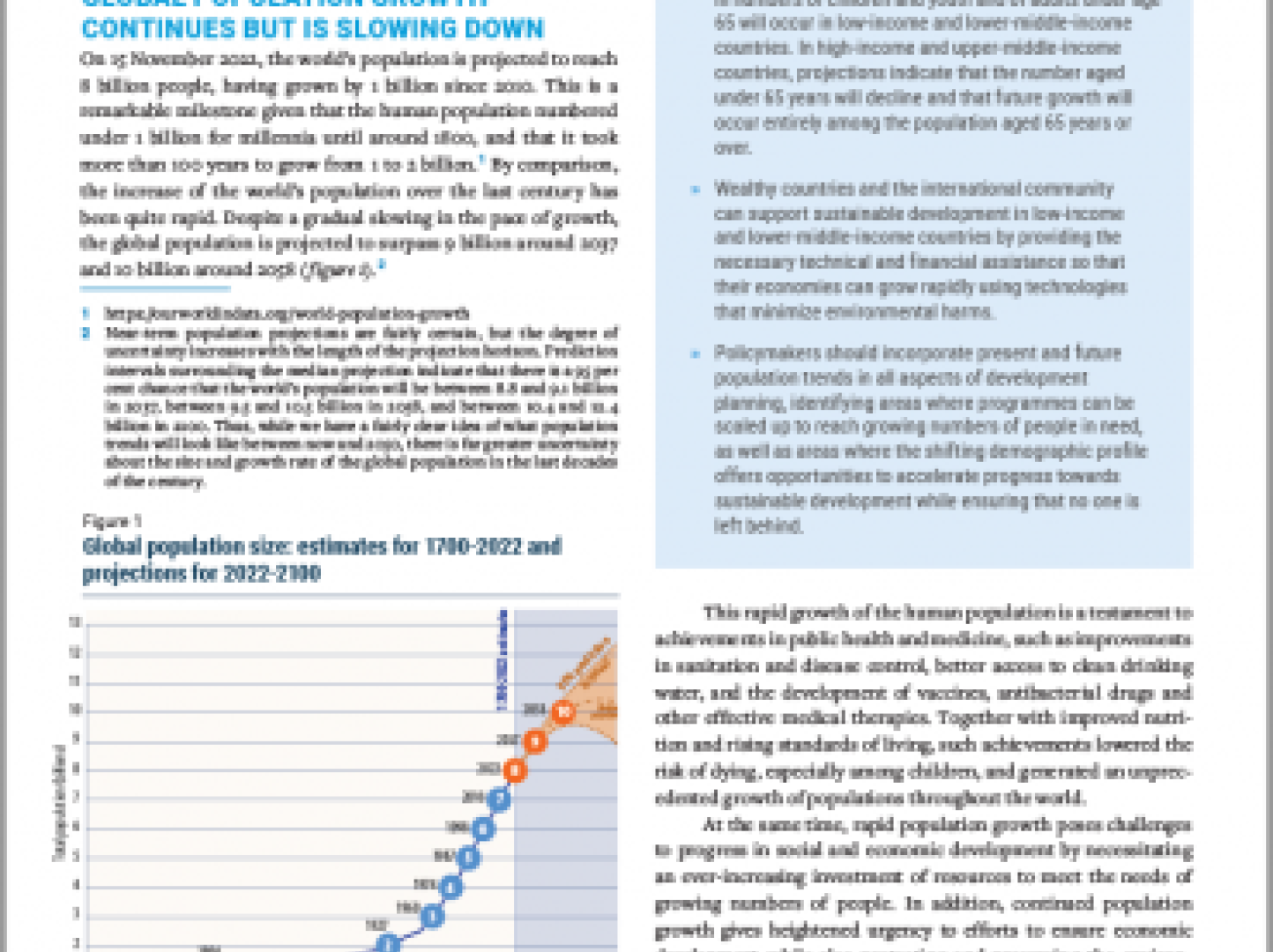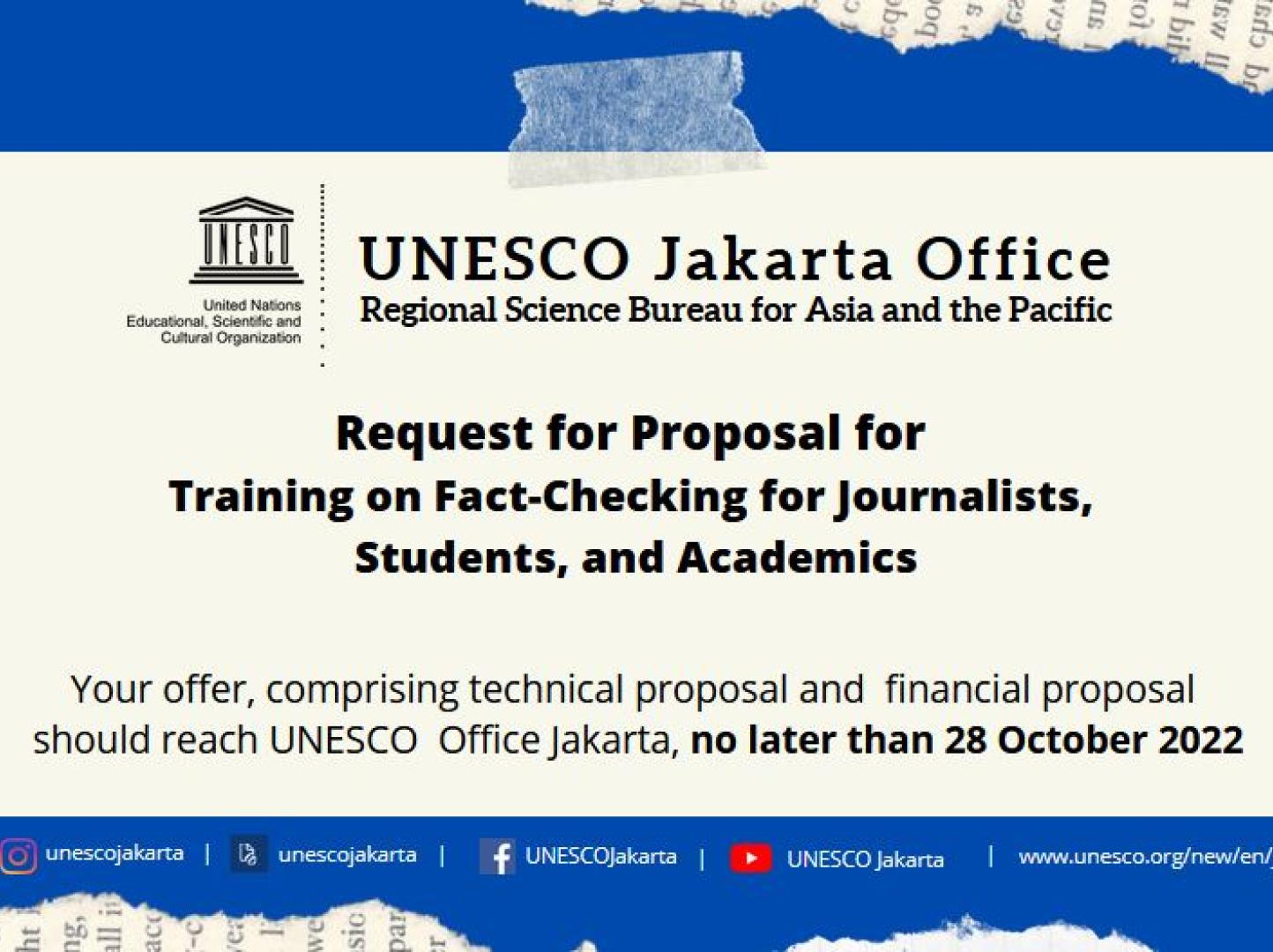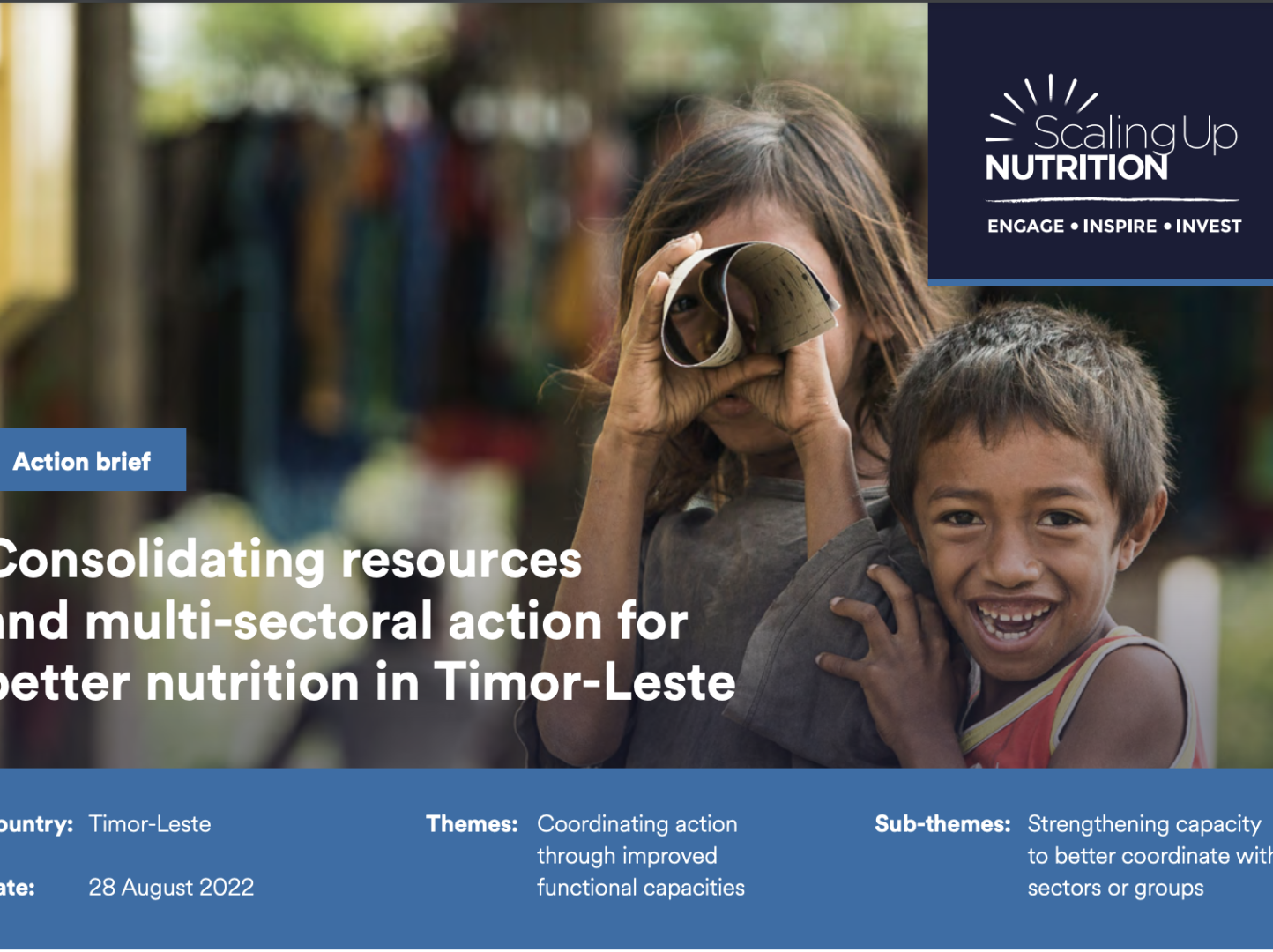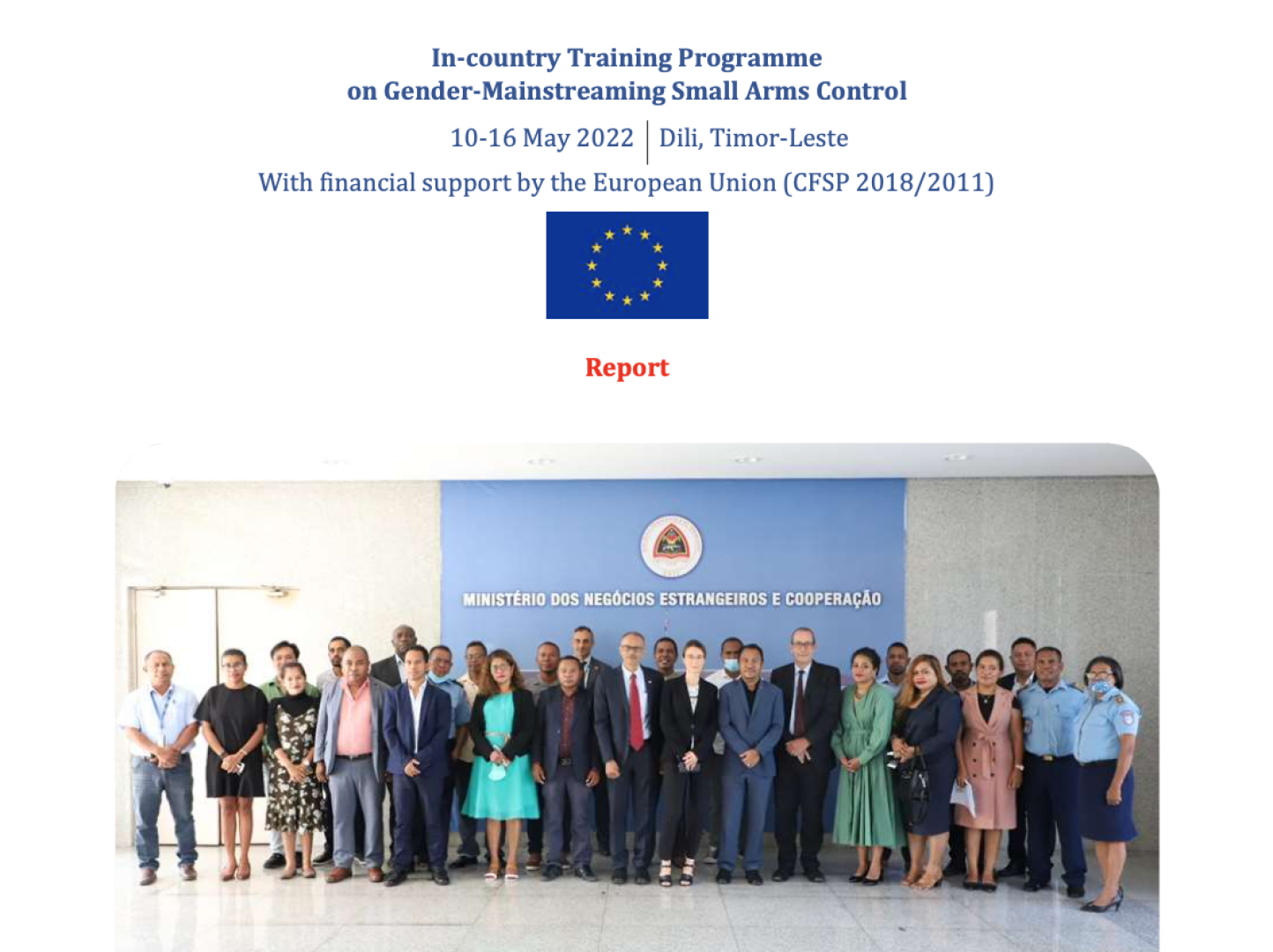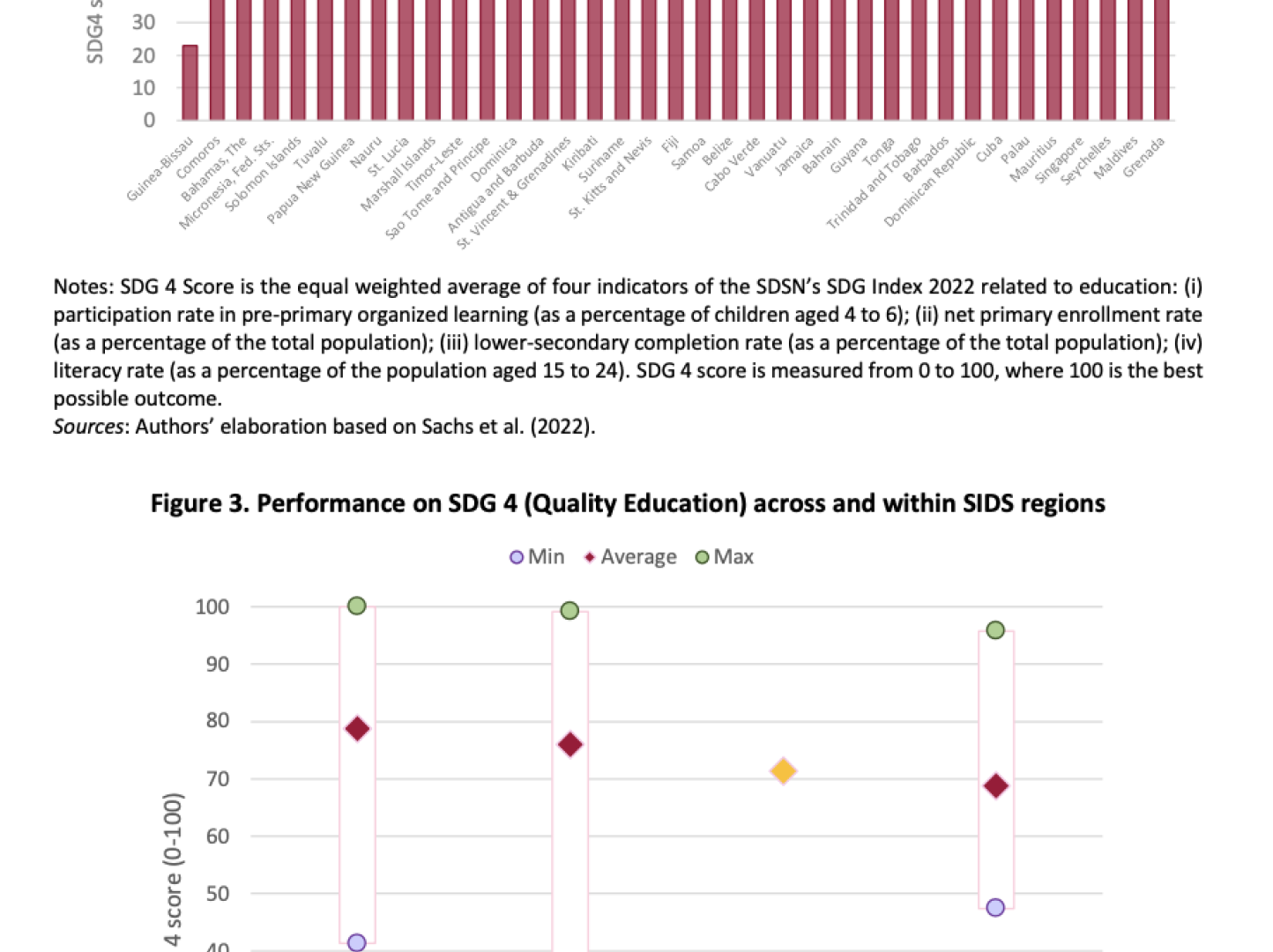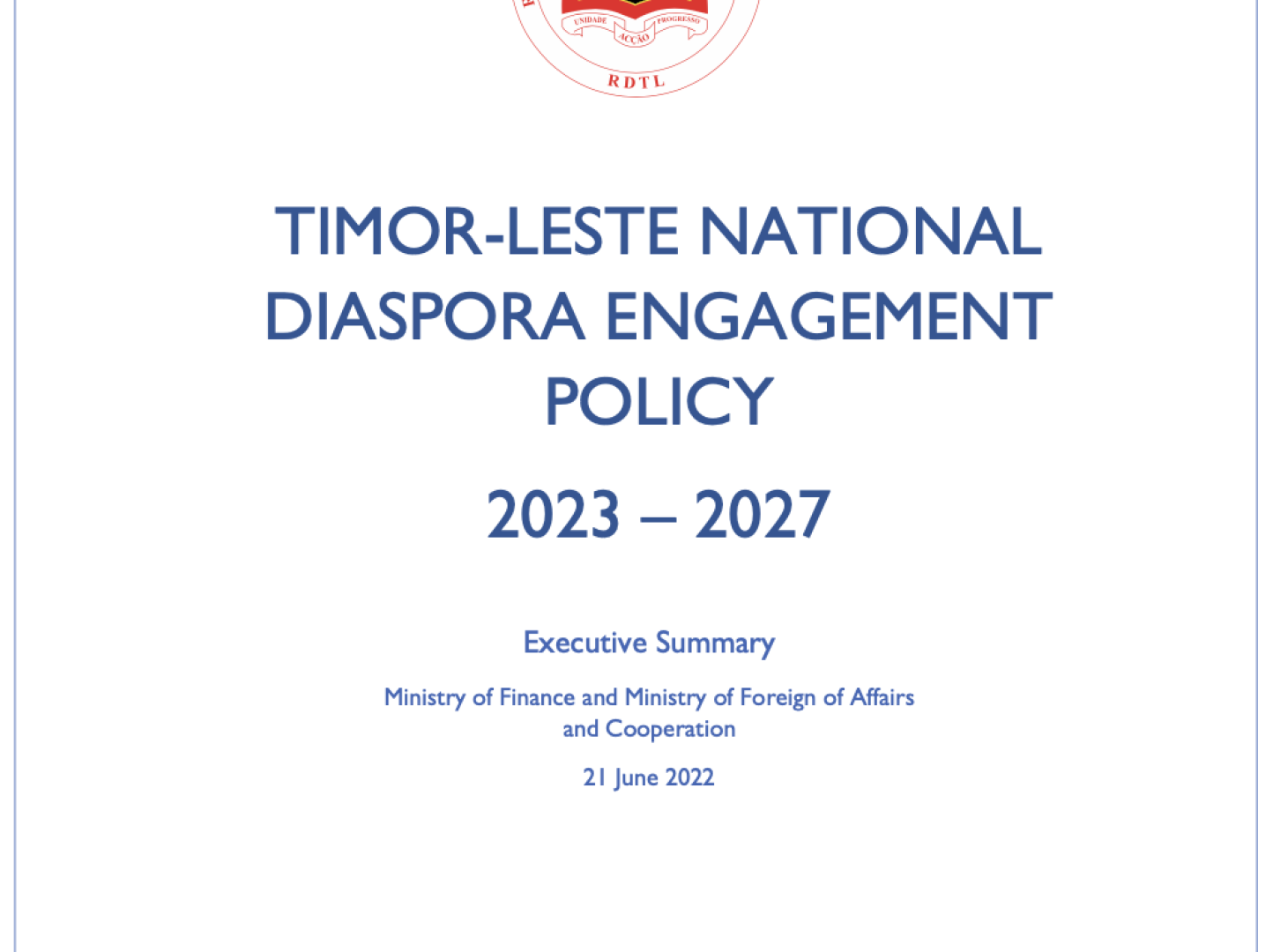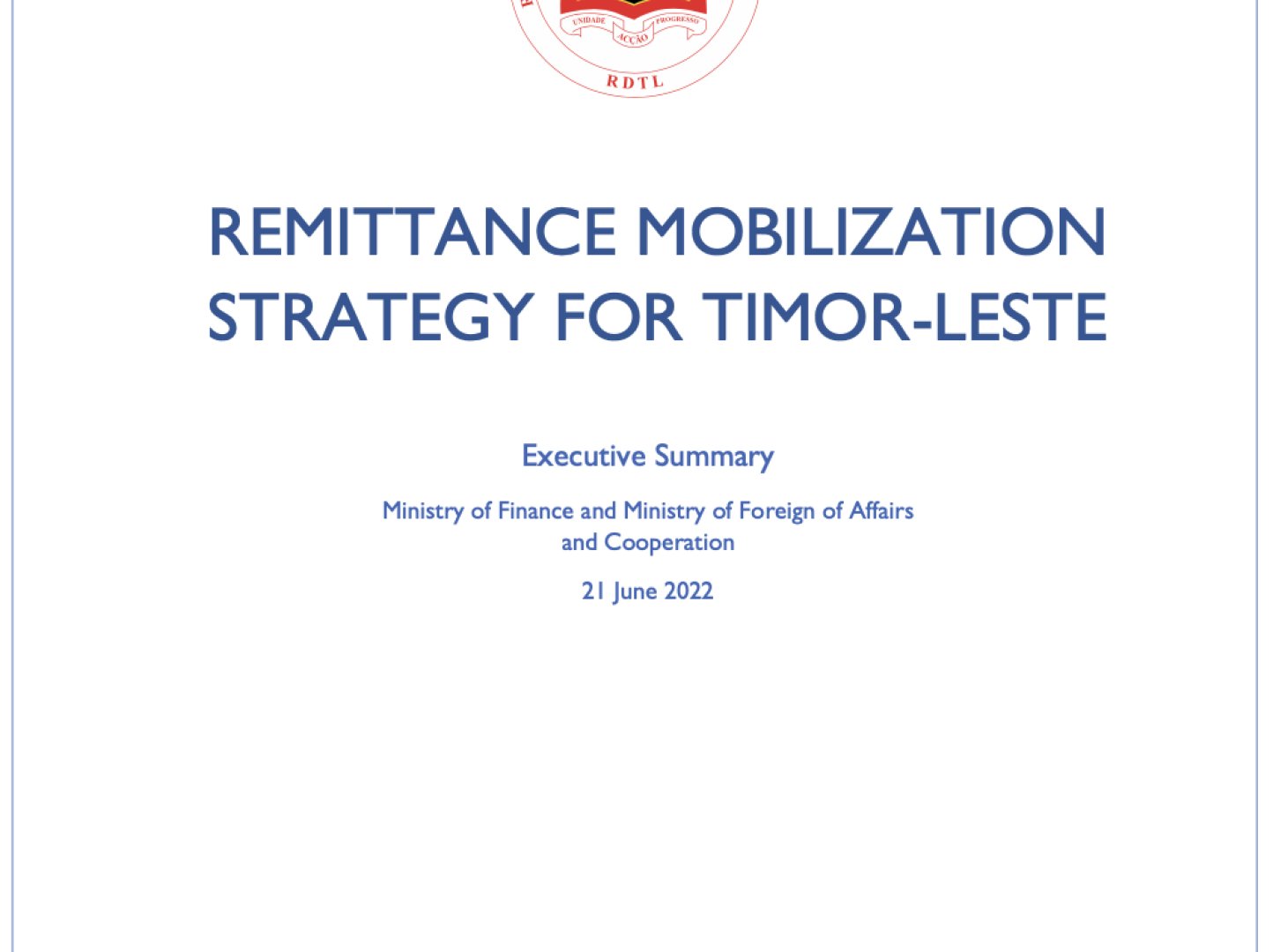Latest
The Sustainable Development Goals in Timor-Leste
The Sustainable Development Goals are a global call to action to end poverty, protect the earth’s environment and climate, and ensure that people everywhere can enjoy peace and prosperity. These are the goals the UN is working on in Timor-Leste:
Story
21 September 2023
Avansa to’o 2030 - Opsaun no Oportunidade ba Timor-Leste
Iha tinan 2015, governu sira husi nasaun hotu-hotu, sosiedade sivíl no umanidade tomak foti esforsu boot ida hodi adopta Objetivu Dezenvolvimentu Sustentavel (ODS) - ambisiozu, haree ba oin, no atu hetan liuhusi parseria no konsensu - ho objetivu atu hasai ema husi kiak, hamenus dezigualdade, no rezolve kestaun sira seluk ne'ebé limita ita-nia potensialidade; atu proteje ita-nia planeta, ita-nia uma, husi mudansa klimátika no dezastre sira ne'ebé kauza husi ema; atu hetan prosperidade ba ema hotu-hotu, hamenus dezigualdade, hamenus modelu konsumu, promove igualdade no justisa, atu nune'e ema hotu-hotu, maske iha sira-nia sirkunstánsia, Bele moris no moris-di'ak; promove ko-ezisténsia pasifika no mundu ida-ne'ebé la iha konflitu; no buat hotu-hotu ne'ebé sei realiza liuhusi parseria - hanesan, respeitu, la iha diferensa bazeia ba nasaun ida-ne'ebé boot, ho ema hotu-hotu iha lian no partisipasaun iha futuru.
Semana ida-ne'e iha Nova Iorke, hahú husi 16 Setembru 2023, mundu ne'e halibur fali hodi marka pontu balun husi ODS sira no diskute dalan sira atu aselera implementasaun ODS sira-ne'e. No ho konkluzaun ne'ebé triste teb-tebes katak ita la'o sai husi dalan atu atinje ODS sira. Iha mundu tomak, iha pandemia COVID, ne'ebé taka mundu, estraga ekonomia no hatudu ita-nia interligasaun; funu foun sira ne'ebé sa'e maka'as; susar ba multilaterizmu no konsensu atu rezolve krize sira ne'ebé urjente liu iha mundu; ameasa emerjente sira husi governu sira ne'ebé eleitu demokrátiku; falta konfiansa ba governu sira ne'ebé eleitu; intoleránsia ne'ebé aumenta maka'as; todan ba tusan boot; dezempregu no inkapasidade atu absorve foin-sa'e sira ba ekonomia. Ita haree hela problema ida-ne'ebé boot kona-ba direitus umanus ne'ebé ita hotu hanoin rezolve ona; diseminasaun notísia falsu no informasaun ne'ebé la loos liu husi média sosiál sira, ho ideolojia perigozu sira sai hanesan "faktu"; Tragédia sira ne'ebé hamosu mudansa klimátika ne'ebé la iha rohan no klaru katak la iha satisfasaun ho asuntu globál no dezigualdade sira ne'ebé aumenta - iha nasaun sira-nia laran, entre nasaun sira no ema sira-nia laran. Tuir mai iha númeru ne'ebé boot katak sei lori tinan 500 tan atu alkansa igualdade jéneru no haree duni feto no labarik-feto sira hanesan ema ho direitu hanesan.
Maski la iha tempu ne'ebé di'ak liu atu moris - teknolojia aprezenta ona oportunidade no transformasaun ne'ebé hakfodak hodi inventa, inovasaun, ligasaun, ne'ebé la eziste de'it iha tinan 50 liubá; iha labarik barak liu ba eskola kompara ho tempu ne’ebé deit iha istória; demokrasia barak liu; muda norma sosiál ne'ebé la'o ba oin no bazeia ba direitu. Ita haree ona aumentu iha Artifisiál Intelijénsia no oportunidade sira ne'ebé aprezenta ona, konsensu globál ne'ebé boot tebes no hakarak loloos atu salva ita-nia planeta; oportunidade foun sira ba kreximentu ekonómiku ne'ebé di'ak no sustentavel no emerjénsia husi bloku podér foun sira iha Global Sul, ko'alia no dezafia ba injustisa istórika sira, enkuantu ezije fatin ne'ebé justu liu - iha negosiasaun finanseira sira, inklui reestruturasaun instituisaun finansiamentu globál sira, iha komérsiu no justisa klimátika. Sira ne'ebé sempre iha direitu marjinál - feto, LGBQTI+, ema ho defisiénsia, joven - hotu-hotu luta hasoru violénsia no diskriminasaun.
Hanesan Exelensia, Prezidente Repúblika, Jose Ramos-Horta, envolve hela iha konversasaun globál no pozisaun lideransa Timor-Leste nian iha Nova Iorke ba Simeira ODS nian, ne'e mak tempu di'ak atu reflete kona-ba oportunidade sira ba tinan 7 oin mai. Ha'u-nia fiar dezde ha'u to'o iha Timor-Leste fulan 9 liubá, no hafoin dekade rua hetan independénsia no dedikasaun atu harii fali nasaun ida-ne'ebé destruída, mak Timor-Leste hanesan nasaun ida-ne'ebé iha oportunidade atu avansa no atinje kreximentu dezenvolvimentu ba ajenda 2030 nian. Timor-Leste, maske iha istória ida-ne'ebé difisil, pasífiku no estavel, ho lideransa ida-ne'ebé konfia, ne'ebé hili husi eleisaun regulár no la-kontroversiál ida ho eleisaun parlamentár ikus ne'ebé hetan susesu iha nasaun ne'e no estabelesimentu governu konstitusionál IX ne'ebé lidera husi S.E., Primeiru-Ministru Xanana Gusmão. Timor-Leste kontinua hatudu respeitu ba direitus umanus, iha instituisaun sira ne'ebé forte, inklui governasaun, nia pozisaun no influénsia iha asuntu internasionál maske ho nia dimensaun, membru ida-ne'ebé iha valór no adere ba padraun internasionál liu husi membru Nasoins Unidas, CPLP, fundador/membru g7+, relasaun bilaterál forte ho nasaun sira iha mundu tomak, no nia estatutu observador atuál ASEAN nian. Nia iha rekursu sira hosi Fundu Petróleu ne'ebé jere didi'ak, atu koko solusaun inovativu sira ba dezenvolvimentu.
Timor-Leste mós sai hanesan nasaun primeiru entre nasaun sira seluk ne'ebé kompromete ona ba Ajenda Dezenvolvimentu Sustentavel tinan 2030 no hahú kedas, nasaun ne'e halo ona revizaun nasionál voluntáriu rua (VNR), ne'ebé foin lalais ne'e aprezenta ona iha Forum Politiku Nivel Aas (HLPF) iha fulan Jullu tinan ida-ne'e.
Maibé, iha kestaun boot sira ne'ebé presiza rezolve. Enkuantu fokus ne'ebé loos mak kona-ba saida mak asuntu sira-ne'e - taxa kreximentu ne'ebé aas ba kapitál umanu husi tinan 2002 to'o 2022; 70% dependénsia ba importasaun ai-han, 40% dezempregu, 48.3% pobreza multidimensional ne'ebé agrava inseguransa ai-han no taxa malnutrisaun ne'ebé aas, 47% husi labarik sira ne'ebé seidauk to'o tinan 5 sofre stunting, rezultadu edukasaun ne'ebé fraku, dezafiu ba infraestrutura no konetividade, seidauk iha fokus sufisiente ba “oinsá” - sistema revizaun kona-ba oinsá dezafiu hotu-hotu nia interasaun, liu husi aproximasaun integradu no koordenadu. Ida ne'e atu orienta oinsá rekursu sira implementa la'ós de'it atu alkansa efisiénsia no efikásia, maibé atu eskala intervensaun sira liuhusi solusaun sira ne'ebé sei rezulta rezultadu eskala, nesesáriu atu alkansa ODS sira. Dezafiu la'ós atu identifika problema sira, maibé atu identifika sistema saida mak presiza troka no oinsá atu intervén ho diferente.
Iha dalan balun ne'ebé Timor-Leste bele avansa no halo iha tinan 7 oin mai.
Primeiru, estabelese objetivu dezenvolvimentu, inklui apoiu husi asisténsia dezenvolvimentu, tenke koordena maka'as iha lideransa governu nian okos. Aprosimasaun ida-ne'ebé integradu husi parseiru governu/dezenvolvimentu sira hotu ne'ebé koordena ona ba planeamentu, prioritiza, identifika populasaun no munisípiu sira ne'ebé presiza liu, orientasaun finansiamentu no eskala tenke sai nu'udar prioridade absoluta.
Porezemplu, planeamentu no intervensaun sira kona-ba uma rurál sira labele hala'o sein análize integradu kona-ba oinsá atu fornese uma rurál sira mós bele uza atu alkansa asesu ba bee, saneamentu, asesu ba kuidadu saúde no edukasaun, uza dadus no evidénsia ne'ebé forte kona-ba saida mak funsiona, inklui atrai tipu investimentu no teknolojia oin-oin hodi alkansa meta sira. Esforsu atu hamenus mortalidade labarik no inan nian, inklui hamenus malnutrisaun no stunting, tenke iha pelumenus empoderamentu feto nian.
Porezemplu, iha estimativa katak feto isin-rua hamutuk 40,000 kada tinan iha Timor-Leste, no ho koordenasaun, planeamentu no alokasaun ne'ebé loos ho valór USD28M kada tinan, feto hamutuk 28,000 ne'ebé reprezenta 70% sei simu kuidadu ante-natal, ema na'in 32,000 ne'ebé reprezenta 80% sei hetan atende husi asistente partu ne'ebé iha kualifikasaun, ema na'in 36,000 ne'ebé reprezenta 90% sei simu kuidadu pos-natal no asesu ba servisu planeamentu familiár ne'ebé sei lori ba alkansa objetivu sira husi ODS kona-ba mortalidade inan nian hamutuk 70/100,000 mortalidade inan iha 2030 no se feto sira simu planeamentu familiár hodi loke espasu ba oan, sei hamenus stunting 50%.
Planeamentu dezenvolvimentu ida-ne'ebé koordena sei rekere konsisténsia, espesializasaun téknika adisionál ne'ebé ajénsia ONU sira lori ba meza no tenke halo ho instituisaun governu relevante hotu-hotu, parseiru dezenvolvimentu bilaterál no ajénsia ONU - atu hala'o planeamentu konjuntu, identifika responsabilidade sira bazeia ba vantajen komparativu, identifika fonte finansiamentu, oinsá atu atrai finansiamentu adisionál, konkorda hamutuk kona-ba saida mak atu halo, oinsá atu halo monitorizasaun no importante liu, saida mak sei atinje eskala.
Segundu, oportunidade ba finansiamentu ba dezenvolvimentu labele depende de'it ba finansiamentu públiku. Tenke identifika fonte finansiamentu seluk ba objetivu dezenvolvimentu nian iha maneira koerente, estratéjiku no kona alvu. Enkuantu orsamentu governu nian ba tinan 5 oin mai identifika ona prioridade no orsamentu sira, ida-ne'e mesak de'it labele finansia realizasaun ODS sira-nian. Sei iha nafatin nesesidade atu halo kustu finansiamentu hodi alkansa ODS sira iha períodu tinan 7 nia laran no finansiamentu adisionál saida mak bele hetan asesu. Ida ne'e sei la'ós de'it fo rezultadu lalais no kresimentu ekonómiku maibé sei garante estabilidade ba Fundu Petroliferu. ONU iha istoriku iha konvoka konversasaun kona-ba finansiamentu inovativu, inklui kona-ba finansiamentu bazeia ba rezultadu, iha ne'ebé investidór sira selu fali governu ba rezultadu espesífiku sira kona-ba edukasaun no alvu saúde nian. Diálogu hirak-ne'e atu halibur parseiru tradisionál no investidór privadu sira, instituisaun finansiamentu multilaterál sira kona-ba identifika fatin ne'ebé mak iha sentidu atu investe iha Timor-Leste, la'ós de'it atu kria empregu maibé atu kria emprezariedade lokál (franchising, cadeia de valór, asesu ba teknolojia, rekursu, abilidade, dijitalizasaun) ne'ebé sei responde ba dezafiu sosiál sira. Konversasaun sira-ne'e mós sei identifika dalan konkretu ba investimentu no finansiamentu, ho objetivu klaru no vontade polítika ne'ebé forte, atu hasai bloku sira-ne'e. Porezemplu, PNUD dezenvolve ona mapa investidór ODS ba nasaun sira iha Azia (Malazia, Tailandia, Sri Lanka, etc.), ajuda governu sira-ne'e atu identifika oportunidade ba investimentu privadu sira atu alkansa ODS no identifika investidór privadu/sosial potensiál sira, enkuantu suporta governu sira atu kria ambiente ida-ne'ebé bele fasilita.
Terseiru, tenke iha esforsu konsultadu ida no rekursu inisial sira ba dijitalizasaun no abilidade sira ne'ebé liga ho kriasaun empregu. Planu kona-ba kriasaun empregu ba foin-sa'e sira tenke foka liu ba kriasaun empregu dijitál sira. Planu ne'e tenke dezeña bazeia ba enkuadramentu adaptativu ida atu identifika abilidade téknika no dijitál ne'ebé presiza no númeru ema ne'ebé disponivel ba abilidade hirak-ne'e, atu aselera kapasitasaun ekonómika, rekoñese dezafiu kontinu sira iha sistema no infraestrutura sira, dezenvolve enkuadramentu formasaun tékniku no dijitál ida, hahú husi inisiu, identifika iha ne'ebé mak abilidade hirak-ne'e sei implementa no sustenta no sistema monitorizasaun ida-ne'ebé forte ne'ebé deliberadu - mak planu ne'e bele lao?
Ba dala haat, protesaun ba direitus umanus no dezigualdade sira ne'ebé iha ligasaun tenke sai sentrál ba foti desizaun kona-ba dezenvolvimentu. Asesu ba servisu ho kualidade no abilidade atu iha abilidade no instrumentu atu hadi'a kondisaun moris, liuliu ba ema ne'ebé vulneravel liu, nu'udar direitu fundamentál ne'ebé sidadaun sira tenke iha kbiit atu ezije, no governu nu'udar ema ne'ebé kaer devér, tenke fornese hanesan baze atu alkansa objetivu dezenvolvimentu no kria pás sustentavel ho maneira inkluzivu no la-diskriminatoriu.
Ikusliu, buat hotu iha leten labele akontese sein reforma governasaun - setór públiku ida-ne'ebé ativu, kapasitadu no adekuadu ho kapasidade atu orienta desizaun polítika sira, maibé konsistente no apolitiku nafatin. Sistema jestaun finanseira públiku ida-ne'ebé halo monitorizasaun ba despeza governu nian ne'ebé hale'u alkansa meta sira no la'ós de'it despeza no prestasaun servisu sira no permite foti desizaun lalais iha nivel foti desizaun ne'ebé aas liu, suporta mudansa lalais iha aprosimasaun sira bainhira presiza no hamenus duplikasaun la'ós de'it atividade sira maibé iha funsaun no instituisaun sira.
Ha'u hakarak atu ramata ho subliña dalan balun ne'ebé ONU no ninia ajénsia espesializada sira bele kontinua fó apoiu ba governu no povu Timor-Leste hodi alkansa ODS sira. ONU nia vantajen komparativu mak iha nia baze koñesimentu ne'ebé luan husi Timor-Leste no globalmente, atu fornese konsellu polítika imparsiál no neutral, inklui uza bid data (hanesan sensus). Ajénsia ONU nian, iha koordenasaun husi Koordenador Rezidente ida-ne'ebé iha kapasidade, bele fó apoiu ba governu hodi fasilita finansiamentu adisionál, inklui liuhusi investimentu sosiál sira, atu konvoka fasilita parseria rejionál no globál sira, eskala projetu pilotu sira- kona-ba saúde, nutrisaun, transformasaun sistema ai-han, hapara stuntung labarik sira no mortalidade inan no iha fornesimentu abilidade sira kona-ba kriasaun empregu. ONU nia papél normativu no apoiu ba governu nu'udar xave atu asegura katak governu kontinua kumpre nia responsabilidade direitus umanus, promove igualdade jéneru no empoderamentu feto sira-nian, no mós halo relatóriu kona-ba konvensaun ONU nian ne'ebé Timor-Leste asina - hotu-hotu importante atu fasilita realizasaun Programa Governu IX nian ne'ebé lori ba ODS.
1 of 5
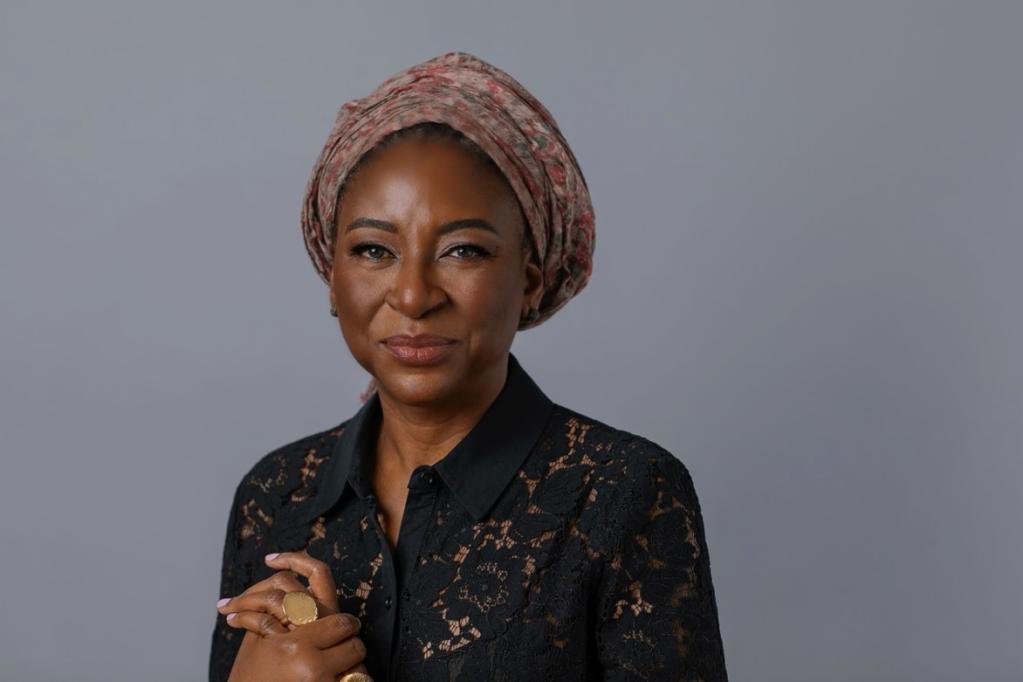
Story
21 September 2023
Leapfrogging into 2030 – Options and Opportunities for Timor-Leste
In 2015, governments of all nations, civil society, and humanity as a whole took a giant stride by adopting the Sustainable Development Goals (SDGs) - ambitious, forward-looking, and to be achieved through partnerships and consensus - with the aim of lifting people out of poverty, reducing inequalities, and addressing other issues that limit our potential; of safeguarding our planet, our only home, from climate change and human-induced disasters; of achieving prosperity for all, reducing inequalities, rebalancing consumption patterns, promoting equity and justice so that all individuals, regardless of their circumstances at birth, can thrive and prosper; fostering peaceful coexistence and a world without conflicts; and all of this to be accomplished through partnerships – equal, respectful, without distinctions based on the size of a country, with everyone having a voice and a stake in the future.
This week in New York, from 16 September 2023, the world is again gathering to mark the halfway point of the SDGs and discuss ways in which to accelerate the implementation of the SDGs. And within the backdrop of the very depressing conclusion that we are completely off-track in achieving the SDGs. Globally, there has been the COVID pandemic, which shut down the world, ruined economies and demonstrated starkly our interconnectedness; new and escalating wars; the rising distrust of multilateralism and consensus to resolve the world’s most urgent crises; the emerging threats of the overthrowing of democratically elected governments; increasing lack of confidence in elected governments; growing intolerance; huge debts burden; unemployment and inability to absorb young people into economies. We are witnessing a growing backlash on human rights that we all thought were settled; dissemination of fake news and misinformation through social media, with dangerous ideologies becoming ‘facts’; unending climate change-induced tragedies and clearly a dissatisfaction with global state of affairs and growing inequalities – within countries, among countries and within people. Then there is the grim figure that it would take us another 500 years to achieve gender equality and truly see women and girls as human beings with equal rights.
Even with all the bleakness around us, there is no better time to be alive – technology has presented astounding opportunities and transformation to invent, innovate, connect, that did not exist just 50 years ago; there are more children in school than any time in history; more democracies; changing of social norms that are more progressive and rights-based. We have seen the rise of Artificial Intelligence and the opportunities it presents, the overwhelming global consensus and genuine desire to save our planet; new opportunities for green and sustainable economic growth and the emergency of new blocs of power in the Global South, speaking up and challenging historical injustices, while demanding fairer playing ground – in financial negotiations, including for the restructuring of global financing institutions, on trade and on climate justice. Those whose rights have always been marginal – women, LGBQTI+, people with disabilities, young people – are all fighting back, against violence and discrimination.
As His Excellency, the President of the Republic, Jose Ramos-Horta, is engaging in the global conversations and positioning Timor-Leste’s leadership in New York for the SDG Summit, this is a good time to reflect on the opportunities for the next 7 years. My belief since I got to Timor Leste 9 months ago, and after two decades of independence and dedicated rebuilding of a then wrecked country, is that Timor-Leste is one of the few countries with the opportunities to leapfrog and achieve development growth in time for the 2030 agenda. Timor-Leste, despite a difficult history, is peaceful and stable, with a trusted leadership, enabled by regular and uncontroversial elections with the country’s last successful parliamentary elections and the establishment of the IX constitutional government under the leadership of HE, Prime Minister Xanana Gusmao. Timor-Leste continues to demonstrate respect for human rights, has strong institutions, including for governance, its position and influence in international affairs despite its size, a valued member and adherent to international standards through membership of United Nations, the CPLP, founder/member of g7+, strong bilateral relations with countries across the world, and its current observer status of ASEAN. It has the resources from a properly managed Petroleum Trust Fund, to test innovative solutions to development.
Timor-Leste was also among the first countries to commit to the 2030 Agenda for Sustainable Development and since then, the country has conducted two voluntary national reviews (VNR), the latest of which was presented at the High-level Political Forum (HLPF) in July of this year.
There are, however, major issues that will need to be addressed. While the focus rightly has been on the ‘what’ of the issues – a flat rate of growth for human capital from 2002 to 2022; 70% dependency on food imports, 40% rate of unemployment, 48.3% multidimensional poverty that aggravates food insecurity and a high malnutrition rates, 47% of children under 5 suffering from stunting, poor education outcomes, challenging infrastructure and connectivity, there has not been enough focus on the ‘how’ – systems review on how all the challenges interact, through an integrated and coordinated approach. This is to guide how resources are deployed to not just achieve efficiency and effectiveness, but in scaling up interventions through solutions that will result in scale of outcomes, necessary to achieve the SDGs. The challenge is not about identifying the problems, but in identifying what systems need to change and how to intervene differently.
There are a few ways in which Timor-Leste can leapfrog and make the next 7 years count.
First, setting development objectives, including support from development assistance, must be strongly coordinated under government leadership. An integrated and whole of government/development partners coordinated approach to planning, prioritizing, identifying the most in need populations and municipalities, guiding financing and scale must be an absolute priority. For example, planning and interventions on rural housing cannot be undertaken without an integrated analysis of how the provision of rural housing can also be used to simultaneously achieve rural access to water, sanitation, access to health care and education, using strong data and evidence of what works, including attracting different types of investments and technology to achieve the goals. Efforts at reducing child and maternal mortality, including reducing malnutrition and stunting, must have at the very least, women’s empowerment at its core. For example, there are an estimated 40,000 pregnant women per annum in Timor-Leste, and with right coordination, planning and allocation of USD28M a year, 28,000 women representing 70% will receive ante-natal care, 32,000 representing 80% will be attended to by skilled birth attendant, 36,000 representing 90% will receive post-natal care and access to family planning services which will lead to achievement of SDG targets on maternal mortality of 70/100,000 maternal mortality by 2030 and if the women receive family planning to space their children, will reduce stunting by 50%.
A coordinated development planning will require consistency, additional technical expertise of which UN agencies bring to the table and must be done with all relevant government institutions, bilateral development partners and UN agencies – to undertake joint planning, identify responsibilities based on comparative advantage, identify sources of funding, how to attract additional financing, agree jointly on what to track, how to track and most importantly, what will achieve scale.
Second, opportunities for financing for development must not only rely on public finance. Other sources of financing for development goals must be identified in a coherent, strategic and targeted way. While the government budget for the next 5 years has identified priorities and budget, this alone cannot finance the achievement of the SDGs. There will still be a need to undertake the cost of/financing for achieving the SDGs within a 7-year period and what additional financing can be accessed/mobilized. This will not only fast-track results and economic growth but will ensure stability for the Petroleum Fund. UN has a track record in convening conversations around innovative financing, including on outcome-based financing, where investors repay the government for the achievements of specific outcomes on education and health targets. These dialogues are to bring together traditional partners and private investors, multilateral financing institutions on identifying where it makes sense to invest in Timor-Leste, not just to create jobs but to create local entrepreneurship (franchising, value-chains, access to technology, resources, skills, digitalization) that will concurrently address social challenges. The conversations would also identify concrete roadblocks to investments and financing, with clear targets and strong political will, to remove the blocks. For example, UNDP has developed SDG Investor Maps for countries in Asia (Malaysia, Thailand, Sri Lanka, etc.), helping these governments identify opportunities for private investments to achieve SDGs and identifying potential private/social investors while supporting governments to create an enabling environment.
Third, there must be a concerted effort and seed resources for digitalization and skills linked to job creation. A plan around job creation for young people must be centred on creating digital jobs. The plan must be designed around an adaptive framework in identifying the technical and digital skills needed and the number of people available for these skills, to accelerate economic empowerment, recognizing the perennial challenges in systems and infrastructure, developing a technical and digital skills training framework, from the start, identifying where these skills would be deployed and sustained and a strong monitoring system that is deliberate – is the plan working?
Fourth, the protection of human rights and bridging inequalities must be central to decision-making around development. Accessing quality services and ability to have the skills and tools to improve livelihoods, especially for the most vulnerable, are fundamental rights that citizens must be able to demand, and the government as duty bearers, must provide as the foundation for achieving development objectives and engendering sustainable peace in an inclusive and non-discriminatory way.
Finally, all the above cannot happen without governance reforms – an agile, capacitated and fit-for-purpose public sector with the ability to guide political decisions while remaining consistent and apolitical. A public financial management system that tracks government spending around achievement of targets and not just expenditure and delivery of services and enables quick decision-making at the highest level of decision making, supporting quick changes in approaches when necessary and reduction in duplication of not just activities but in functions and institutions.
I would like to end by re-emphasizing some ways in which the UN and its specialized agencies can continue to support the government and people of Timor-Leste in achieving SDGs. UN's comparative advantage lies in its extensive knowledge base from Timor-Leste and globally, to provide impartial and neutral policy advice, including using big data (census for example). UN agencies, under the coordination of an empowered Resident Coordinator, can support the government to facilitate additional financing, including through social investments, to convene facilitate regional and global partnerships, scaling up pilot projects– on health, nutrition, food systems transformation, ending child stunting and maternal mortality and in the provision of skills on job creation. UN’s normative role and support to government are key to ensuring the government continues to fulfil its human rights accountability, promotes gender equality and empowerment of women while also reporting on UN conventions of which Timor-Leste is a signatory – all critical to enabling the achievement of the IX Government Programme leading to the SDGs.
1 of 5

Story
10 May 2022
Solidarity to End Violence
Viqueque, Timor-Leste.
The two-day ‘Do No Harm’ workshop on ethical and safe approach when responding to cases of gender-based violence (GBV) was held on March 30, 31 in Viqueque, Timor-Leste. The ‘Do No Harm’ workshop aims to promote better understanding of the nature of Violence Against Women and Girls (VAWG) which interlinks with mental health of the survivors, and supports local communities to adopt ‘Do No Harm’ approach, namely ethical and safe method when respond to cases of VAWG. The workshop has been conducted in three municipalities, Bobonaro, Ermera and Viqueque, lectured by Civil Society Organizations (CSOs), local authorities and Justice Institutions that work closely on VAWG and GBV. At the seminar, the participants including school teachers and students are encouraged to share their experiences when dealing with GBV cases and survivors, and discuss about how they can improve local community to response and prevent the VAWG.
Irene Kobesi works as the PNTL (Policia National Timor-Leste) First Sergeant in Vulnerable Person Unit (VPU), supporting survivors of Violence Against Women and Girls (VAWG). She said “I participated in the ‘Do No Harm’ workshop, because, as a VPU officer, my duty is to protect women and girls.” At the workshop, interconnections between VAWG and mental health of the survivors were underlined to understand the wider perspective of VAWG: survivors are harmed not only when they received violence, but also when they receive indiscreet questions about the sexual violence during the judicial process.
https://youtu.be/ilSYHxHS7Cc
During the seminar, it was emphasized that people’s better understandings of VAWG and cooperation from local authorities are necessary to eliminate VAWG at the community level. Maria Odete do Amaral, a Chief of Village in Viqueque, stated “I really wanted to join this seminar because this is essential for me as a community leader. I can share what I learned in this seminar with my community, and those who experienced violence, mostly women and girls.” While “Prevention of domestic violence can start from family. If we have knowledge in VAWG, domestic violence can be prevented in the early stage. If we solve family issue with violence, our children never learn how to solve problem without violence” addressed by Jose Delima, a Coordinator of Public Defender.
In Timor-Leste, climate change also exacerbates cases of VAWG. In the interview, Irene shared her experience in the flash floods during March 29th -April 4th 2021, resulted in disastrous landslide that produced more than 15,000 internally displaced people right after the disaster. “Last year, we experienced the catastrophic flood. Some people were traumatized, because they didn’t have place to live, and experienced violence from their partners. We provided support to those who suffered from both flood and violence. If their houses are not safe to live, we contacted local authorities to provide them an emergency shelter.”
To respond and prevent VAWG, a bottom-up approach to adopt ‘Do No Harm’ at the community level is essential, because the causes of the violence are deeply connected to the social context of Timor-Leste. “Together, we can end violence against women and girls” concluded Irene.
By Fidelia Mendonca, Ayumi Kimura
1 of 5
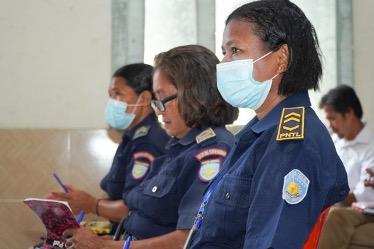
Story
18 April 2022
Historical insights, sustainable and inclusive development: What they might mean for us now and for the future
An essential first step is perhaps to help people clearly define what type of national development people of Timor-Leste would like to see in their country
The United Nations is here to support the government and the people of Timor-Leste. The SDGs and 2030 Agenda for Sustainable Development offer evidenced-based and solution-based directions for an inclusive, prosperous and sustainable future for all.
With the second round of the Presidential Elections imminent, it has been an interesting and exciting past week, thinking about now as well as the future of the country. Irrespective of the people’s decision for either of the candidates, the President’s ‘father-of-the-nation’ role entails a key guiding role that contributes to strengthening the economy, political systems, collaborations, and reconciliation in the wake of the COVID-19 fallout and critical development challenges facing the country.
In the past week, I had the privilege of joining an exciting and insightful online webinar featuring an interview with Professor Jeffrey Sachs on Accelerating Progress on SDGs in Malaysia . The interview –skillfully moderated by my friend and colleague UN Resident Coordinator for Malaysia and Singapore, Ms Karima El Korri – was organised by the Sunway University and the Sustainable Development Solutions Network (SDSN), part of a global network of universities and institutions promoting sustainable development practices. Incidentally, we (the UN) are assisting the University of Timor-Leste to join this Network soon. As always, Professor Sachs covers a lot of historical ground and makes fascinating connections between social and economic progress and many global challenges that the world faces today. He starts by drawing attention to the combination of events that contributed to global economic growth in the period after 1776 (imperialism, the industrial revolution, the role of fossil fuels, self-interest, the dominance of market economies and many other factors).
Professor Sachs points out that “…one of the reasons the world is struggling to reduce its dependence on fossil fuels is that we have had 200+ years of economic growth based on a reliance on fossil fuels and market economies. The powerful forces behind fossil fuels are pervasive and shape almost every aspect of our lives. So, breaking that dependence and reducing our reliance on fossil fuels and shifting towards carbon-neutral growth may take years, possibly decades.” This is why governments and development institutions need to prepare long-term plans now and to ensure that these are practically progressed annually for this critical global transition. He notes that sadly even after the past decade of rising global temperatures and changing global weather patterns contributing to more frequent and devastating environmental disasters, as well as the loss of biodiversity and the COVID-19 pandemic, we have yet to see many governments, industries and international institutions develop and implement robust long-term (20-year plus) plans for zero carbon growth. As the IPCC (International Panel on Climate Change) has said on many occasions (see: https://www.nature.org/en-us/what-we-do/our-insights/perspectives/ipcc-report-climate-change/) ‘time is running out’! “…one of the reasons the world is struggling to reduce its dependence on fossil fuels is that we have had 200+ years of economic growth based on a reliance on fossil fuels and market economies. The powerful forces behind fossil fuels are pervasive and shape almost every aspect of our lives. So, breaking that dependence and reducing our reliance on fossil fuels and shifting towards carbon-neutral growth may take years, possibly decades.” By making a powerful case for the SDGs (Sustainable Development Goals) as the guiding principles for a better, more sustainable world for all, he advocates for “six big transformations” that he believes are essential for nations in the Asia-Pacific region (all of whom, according to data from ESCAP, are ‘off-track in terms of progress against the SDGs’ (see: https://data.unescap.org/data-analysis/sdg-progress.) The Asia-Pacific region is home to 60% of the global population, so if the world is to achieve the SDGs by 2030, it is vital that this region achieves the progress that is needed. The six transformations that Professor Sachs’ identifies are: (i) Quality Education for all; (ii) Health for all; (iii) Energy and industrial transformation; (iv) Sustainable land use (and one might add, especially for small island states and many others sustainable use of oceans); (v) sustainable cities; (vi) Digital transformation. While also emphasising the vital importance of gender equality and inclusion, Professor Sachs’ makes a personal plea for increased women’s leadership globally and in all spheres to accompany and accelerate the transformations needed to create a better world for all. This presentation made me reflect on the work that the UN is supporting in Timor-Leste and elsewhere. How can we better support political leaders, governments and key institutions in the countries we serve to develop serious, long-term, inclusive, and sustainable plans for climate action and carbon-neutral growth? And more importantly, how can we more effectively support the development and implementation of long-term plans for such transformations? An essential first step is perhaps helping people clearly define what type of national development they would like to see in their country. In my conversations with some Timorese citizens, I have heard friends and colleagues say that they would like Timor-Leste to be more like Singapore. I wonder, however, which aspects of Singapore’s development people in Timor really value. If that is a ‘model’ that Timorese citizens want to emulate, how can we start to chart a path to move from where we are now to foster a model of development that benefits and creates a better, more sustainable future for all? And critically, how can we ensure that progress is measured year-on-year to safeguard a better future for all?
With the second round of the Presidential Elections imminent, it has been an interesting and exciting past week, thinking about now as well as the future of the country. Irrespective of the people’s decision for either of the candidates, the President’s ‘father-of-the-nation’ role entails a key guiding role that contributes to strengthening the economy, political systems, collaborations, and reconciliation in the wake of the COVID-19 fallout and critical development challenges facing the country.
In the past week, I had the privilege of joining an exciting and insightful online webinar featuring an interview with Professor Jeffrey Sachs on Accelerating Progress on SDGs in Malaysia . The interview –skillfully moderated by my friend and colleague UN Resident Coordinator for Malaysia and Singapore, Ms Karima El Korri – was organised by the Sunway University and the Sustainable Development Solutions Network (SDSN), part of a global network of universities and institutions promoting sustainable development practices. Incidentally, we (the UN) are assisting the University of Timor-Leste to join this Network soon. As always, Professor Sachs covers a lot of historical ground and makes fascinating connections between social and economic progress and many global challenges that the world faces today. He starts by drawing attention to the combination of events that contributed to global economic growth in the period after 1776 (imperialism, the industrial revolution, the role of fossil fuels, self-interest, the dominance of market economies and many other factors).
Professor Sachs points out that “…one of the reasons the world is struggling to reduce its dependence on fossil fuels is that we have had 200+ years of economic growth based on a reliance on fossil fuels and market economies. The powerful forces behind fossil fuels are pervasive and shape almost every aspect of our lives. So, breaking that dependence and reducing our reliance on fossil fuels and shifting towards carbon-neutral growth may take years, possibly decades.” This is why governments and development institutions need to prepare long-term plans now and to ensure that these are practically progressed annually for this critical global transition. He notes that sadly even after the past decade of rising global temperatures and changing global weather patterns contributing to more frequent and devastating environmental disasters, as well as the loss of biodiversity and the COVID-19 pandemic, we have yet to see many governments, industries and international institutions develop and implement robust long-term (20-year plus) plans for zero carbon growth. As the IPCC (International Panel on Climate Change) has said on many occasions (see: https://www.nature.org/en-us/what-we-do/our-insights/perspectives/ipcc-report-climate-change/) ‘time is running out’! “…one of the reasons the world is struggling to reduce its dependence on fossil fuels is that we have had 200+ years of economic growth based on a reliance on fossil fuels and market economies. The powerful forces behind fossil fuels are pervasive and shape almost every aspect of our lives. So, breaking that dependence and reducing our reliance on fossil fuels and shifting towards carbon-neutral growth may take years, possibly decades.” By making a powerful case for the SDGs (Sustainable Development Goals) as the guiding principles for a better, more sustainable world for all, he advocates for “six big transformations” that he believes are essential for nations in the Asia-Pacific region (all of whom, according to data from ESCAP, are ‘off-track in terms of progress against the SDGs’ (see: https://data.unescap.org/data-analysis/sdg-progress.) The Asia-Pacific region is home to 60% of the global population, so if the world is to achieve the SDGs by 2030, it is vital that this region achieves the progress that is needed. The six transformations that Professor Sachs’ identifies are: (i) Quality Education for all; (ii) Health for all; (iii) Energy and industrial transformation; (iv) Sustainable land use (and one might add, especially for small island states and many others sustainable use of oceans); (v) sustainable cities; (vi) Digital transformation. While also emphasising the vital importance of gender equality and inclusion, Professor Sachs’ makes a personal plea for increased women’s leadership globally and in all spheres to accompany and accelerate the transformations needed to create a better world for all. This presentation made me reflect on the work that the UN is supporting in Timor-Leste and elsewhere. How can we better support political leaders, governments and key institutions in the countries we serve to develop serious, long-term, inclusive, and sustainable plans for climate action and carbon-neutral growth? And more importantly, how can we more effectively support the development and implementation of long-term plans for such transformations? An essential first step is perhaps helping people clearly define what type of national development they would like to see in their country. In my conversations with some Timorese citizens, I have heard friends and colleagues say that they would like Timor-Leste to be more like Singapore. I wonder, however, which aspects of Singapore’s development people in Timor really value. If that is a ‘model’ that Timorese citizens want to emulate, how can we start to chart a path to move from where we are now to foster a model of development that benefits and creates a better, more sustainable future for all? And critically, how can we ensure that progress is measured year-on-year to safeguard a better future for all?
1 of 5
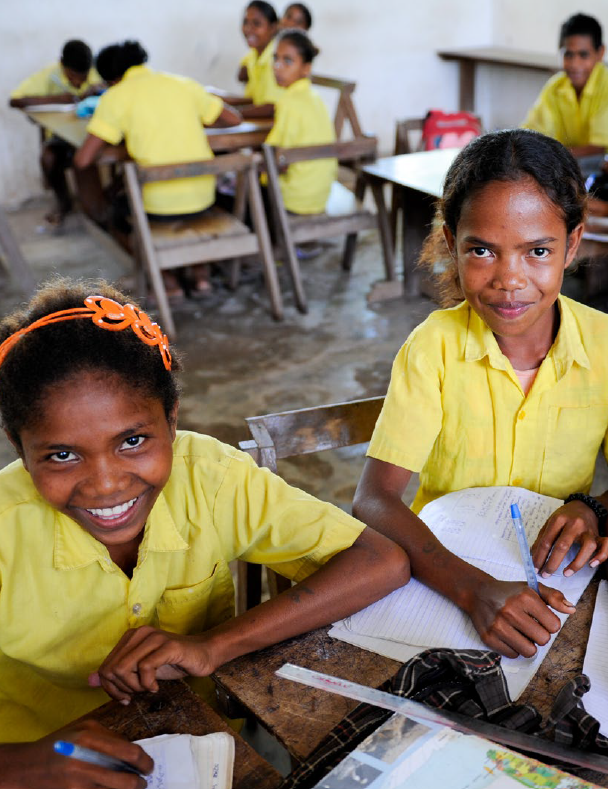
Story
15 March 2022
Children in Grade 1 inspired to learn by peer mentors in Timor-Leste
Around forty children between the ages of five to seven sit in small groups on a large verandah and in classrooms at the Eskola Basic Filial (EBF) Matata school in Ermera Municipality. All of them are completely engrossed in books that they occasionally point to as they emphasize a detail or show each other some of the illustrations.
The setting is a school in the Ermera Municipality, where the UNICEF supported ‘Ready to LEAP’ (Learn, Engage, Achieve, Progress) programme, introduced in 2019 with the Ministry of Education, Youth and Sports, is helping children have a smooth transition from home to formal schooling. Similar activity is being conducted at ten other basic education schools in Ermera and Liquica municipalities.
The initiative helps children who enrolled in grade 1 or those repeating grade 1 to get additional support from the school, their parents, families and other students (peer mentors) to build up their confidence and prepare to continue learning in a school-based setting. Trained peer mentors play a key role in inspiring younger children to learn.
UNICEF Timor-Leste/2020/Dmaia
Grade 3 students involved as young mentors to Grade 1 students in EBF Matata, Ermera municipality.
In a country where only 27 per cent of children are enrolled in preschools, and where the grade 1 repetition rate is 19 per cent, initiatives such as these make a big difference in inspiring younger children to transition smoothly into school-based learning. To date, the school readiness programme has benefitted 1,314 students in grade 1 classes and enabled 439 students between 10 -11 years old from eleven basic education schools to take part in this initiative as peer mentors. So as not to interrupt learning for peer mentors, these sessions take place every Saturday.
The training for teachers and peer mentors at the school in Ermera was initially conducted in 2019 in collaboration with the Ministry of Education, Youth and Sports. However, the rollout of the programme was interrupted by COVID-19 related school closures. Most of the trained peer mentors from Grade 5 and Grade 6, who usually take part in this initiative, had also already graduated or were busy preparing for their final examinations.
However, the EBF Matata basic school introduced new ideas to keep the programme running. Teachers from EBF Matata school started engaging with Grade 2 and Grade 3 students who were once beneficiaries of the programme in 2019, to train and help them become peer mentors themselves and help inspire younger children to learn.
“I feel so happy and proud when the teacher asked me to be a young facilitator. Since joining this programme, I have become much closer to grade 1 students and have become friends with them” said 10-year-old Davio Bosco Cardoso
UNICEF Timor-Leste/2022/LRangel
A peer mentor takes part in an interview through phone call to help other children continue to learn.
Nine-year-old Merelia de Francia Mali Goncalves expressed her excitement at being part of the programme “I feel so proud because I am like a teacher for them, I make them feel happy, to be diligent, and they come to the school every day. So it is a great feeling,” she says.
At the beginning of the programme, teachers accompanied the peer mentors and supported them until the mentors were capable of running the activities on their own. As the programme progressed, teachers say the peer mentors got over their initial shyness and became more confident to speak up and lead the sessions.
“This is not only benefitting the Grade 1 students. After taking a role as peer mentors, the literacy and numeracy skills of the mentors also improved, and so did their social skills, for example, understanding ways to solve problems, or how to communicate with friends and manage time,” said Lurdes Rangel Goncalves, a teacher at the EBF Matata School in Ermera.
With additional funding from UNICEF Australia, the ‘Ready to LEAP’ programme will continue in 2022 and 2023 in 30 more schools in five municipalities. These would incorporate additional inclusive and sustainable approaches, including supporting the participation of children with disabilities.
1 of 5
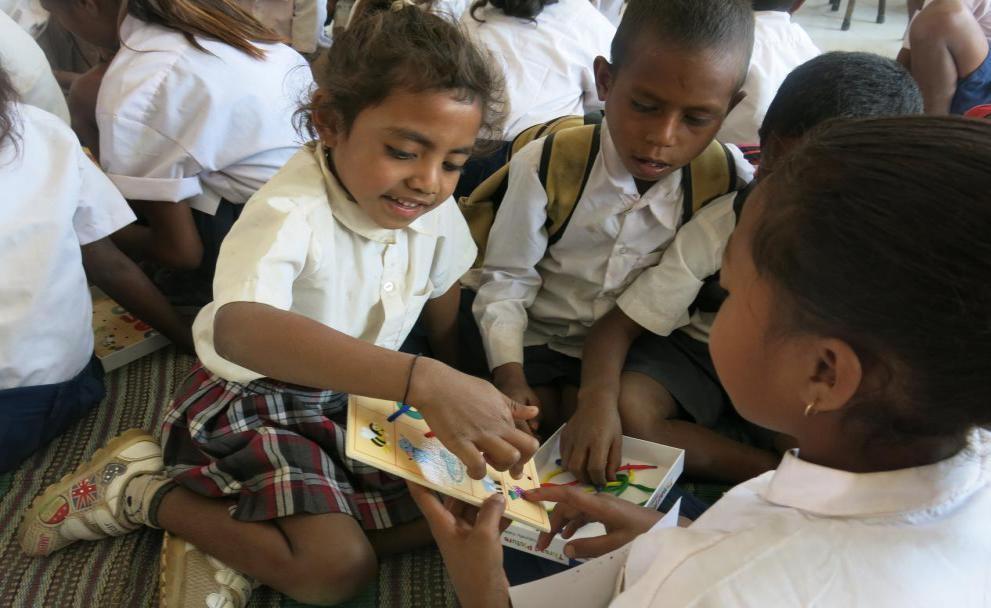
Story
04 April 2024
Disability Empowerment: Chasing Dreams of a Better Future
Ermera, 13th August 2023 - Leonito de Deus was born a healthy little boy until the age of 2, when his life would change forever. After falling ill from an unknown disease, Leonito started to develop a physical impairment that impacts his spine and his ability to walk. Now 13 years old, Leonito has fought hard every day to receive an education and sense of fulfilment in life. From grade 1 until grade 3 Leonito walked on his hands for miles to reach school in his home village of Letefoho. This impressive feat left him dirty, exhausted, and unable to focus on his studies. With very little energy to stay motivated, Leonito stopped going to school.Joanico from Ra'es Hadomi Timor Oan (RHTO) an organisation for people with disabilities, reached out to Leonito’s parents and convinced them to let him stay in Gleno with Leonito’s uncle, so that he can receive assistance from the organisation to help him get back to school. Since moving, Leonito has received a wheelchair and found a vibrant community at his school that treats him with respect and kindness. “I like to play with my friends. They come to play with me at the front of my house, we really love football.”It is clear that improved access to his school and community has made a tangible impact on his life and his ability to participate however, there is still a lot of work to do to increase access and participation for youths with disabilities in Timor-Leste. Evidence suggests violence and abuse of people with disabilities is still common and key infrastructures lack accessibility measures. While Leonito’s participation in school has increased, there are still key access challenges that he is facing.“I can’t operate my wheelchair on my own because it’s too big, so I need my family to take me to school. If no one is home, I still have to walk on my hands for 2 kilometres to get to where I want to go.”
There are also no ramps at Leonito’s home, so he must climb down his porch, through the dirt and over rocks to get to the road. Lack of safe footpaths and ramps in the community make Leonito’s commute to school dangerous and inaccessible. The lack of accessible infrastructure at school is another challenge to navigate, as friends and teachers help Leonito to get into the classroom. Establishing a clear guideline on how to better provide access to participation for youths with disabilities is a pivotal move that has the chance to provide lasting impact on the lives of so many.In July 2022, UNICEF in Timor-Leste, with support from the Australian Government through the Australian NGO Cooperation Program (ANCP), facilitated key consultations in several areas including Ermera, to create a space for youths with disabilities to have their voices prioritised. Recommendations from Leonito and 73 other youths with disabilities have formed a key document called ‘Operational Guidance for the Rights to Participation of Adolescents and Youth with Disabilities in Timor-Leste’.To date, 208 copies of this document have been disseminated across civil society organisations, government, and communities across the nation. UNICEF is leading the way in ensuring all stakeholders understand children’s needs when it comes to access, so that participation is a key focus in all programs moving forward.“I am very happy to see my contributions in this document. I hope that it can be used by the government and other organisations to increase participation for people with disabilities. My dream is to be a director of a disability organisation. I want to help support people with disabilities so they can have a life as good as abled people.”Leonito’s big dreams are echoed by Esperansa Marcal dos Santos, a young 26-year-old woman who proudly participated in this consultation.“My dream is to run my own organisation with my friends who also have disabilities. I want to make sure people have access to information, support, and services.”Much like Leonito, Esperansa was not born with her disability. It was not until she became ill at 10 years old that her family took her to the hospital in Dili. After one week in hospital, she was discharged and told to rest at home. One week later her body started to change, and her physical impairment started to form. The sudden change was confusing for Esperansa and left her devastated, trying to grapple with her new life. However, a lifetime of commitment to receiving an education has seen her celebrate the success of completing high school in 2021. Since graduating, Esperansa helps her mother at home with her siblings however, she wants more opportunities for meaningful participation in consultations and trainings. Due to her physical condition, Esperansa cannot walk very far, much less to training opportunities. There is a strong demand for accessible transport options to increase participation in the community. “I hope that the government and development partners can follow these practical guidelines so everyone can have meaningful participation in the current activities. If these guidelines are not followed, participation is hindered. People need to think about our needs based on our disability.”
Hearing these inspiring stories of local heroes fighting for their right to participation and access, one thing becomes very clear: empowering youth with disabilities to work in leadership positions in disability organisations, to create their own organisations, or to have the right to participate in the workforce, not just empowers youth with disabilities to lead self-determined, fulfilling lives but it paves the way for a more inclusive future. Allowing youth to make decisions on what impacts them is the most sustainable and dignified future to build, and all of this starts with access and participation.
There are also no ramps at Leonito’s home, so he must climb down his porch, through the dirt and over rocks to get to the road. Lack of safe footpaths and ramps in the community make Leonito’s commute to school dangerous and inaccessible. The lack of accessible infrastructure at school is another challenge to navigate, as friends and teachers help Leonito to get into the classroom. Establishing a clear guideline on how to better provide access to participation for youths with disabilities is a pivotal move that has the chance to provide lasting impact on the lives of so many.In July 2022, UNICEF in Timor-Leste, with support from the Australian Government through the Australian NGO Cooperation Program (ANCP), facilitated key consultations in several areas including Ermera, to create a space for youths with disabilities to have their voices prioritised. Recommendations from Leonito and 73 other youths with disabilities have formed a key document called ‘Operational Guidance for the Rights to Participation of Adolescents and Youth with Disabilities in Timor-Leste’.To date, 208 copies of this document have been disseminated across civil society organisations, government, and communities across the nation. UNICEF is leading the way in ensuring all stakeholders understand children’s needs when it comes to access, so that participation is a key focus in all programs moving forward.“I am very happy to see my contributions in this document. I hope that it can be used by the government and other organisations to increase participation for people with disabilities. My dream is to be a director of a disability organisation. I want to help support people with disabilities so they can have a life as good as abled people.”Leonito’s big dreams are echoed by Esperansa Marcal dos Santos, a young 26-year-old woman who proudly participated in this consultation.“My dream is to run my own organisation with my friends who also have disabilities. I want to make sure people have access to information, support, and services.”Much like Leonito, Esperansa was not born with her disability. It was not until she became ill at 10 years old that her family took her to the hospital in Dili. After one week in hospital, she was discharged and told to rest at home. One week later her body started to change, and her physical impairment started to form. The sudden change was confusing for Esperansa and left her devastated, trying to grapple with her new life. However, a lifetime of commitment to receiving an education has seen her celebrate the success of completing high school in 2021. Since graduating, Esperansa helps her mother at home with her siblings however, she wants more opportunities for meaningful participation in consultations and trainings. Due to her physical condition, Esperansa cannot walk very far, much less to training opportunities. There is a strong demand for accessible transport options to increase participation in the community. “I hope that the government and development partners can follow these practical guidelines so everyone can have meaningful participation in the current activities. If these guidelines are not followed, participation is hindered. People need to think about our needs based on our disability.”
Hearing these inspiring stories of local heroes fighting for their right to participation and access, one thing becomes very clear: empowering youth with disabilities to work in leadership positions in disability organisations, to create their own organisations, or to have the right to participate in the workforce, not just empowers youth with disabilities to lead self-determined, fulfilling lives but it paves the way for a more inclusive future. Allowing youth to make decisions on what impacts them is the most sustainable and dignified future to build, and all of this starts with access and participation.
1 of 5
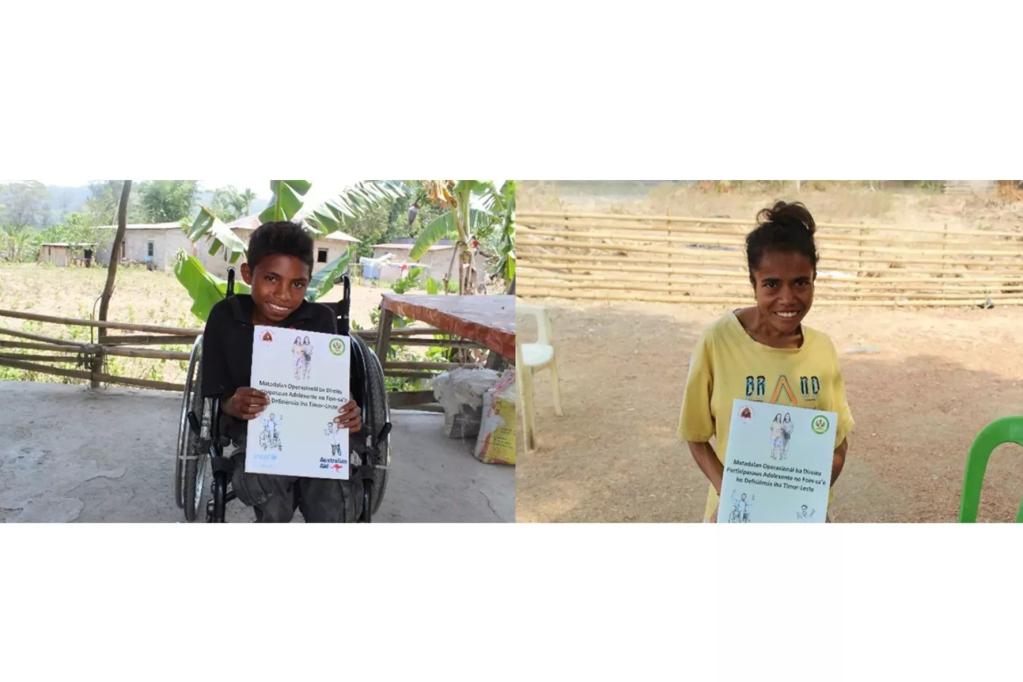
Story
26 March 2024
A 13-year-old student in Timor-Leste learns how to respect others despite a violent childhood
Now Deonisio Moniz, 13, has learned to peacefully cope, thanks to a programme jointly run by Plan International and UN Women.Deonisio, is a seventh-grade student at EBC Sandalo, a primary school in Covalima municipality, in the country’s southwest. His mother, Maria, is a farmer who has been taking care of him and his seven siblings since their father left home. They live in a low-income neighbourhood.Deonisio said his mother, his siblings and his teachers hit him to make him learn. He said he saw many fights in the neighbourhood and took up martial arts to defend himself. It all made him see violence as the way to educate others people and as a stamp of his superiority over them. In July 2023 Deonisio and his mother together attended Connect with Respect, a school-based programme that aims to prevent violence against women and girls by addressing harmful social norms among young students, their teachers and their parents. Plan International jointly runs the programme with UN Women under the Together for Equality project, funded by Korea International Cooperation Agency (KOICA).Deonisio and his mother attended the sessions at the school after his classes, he in the students’ group and his mother in the parents’ group. Through role plays, group tasks and other activities, they learned how to change their ideas about violence, harassment, gender inequality and gender-based violence.In November 2023, Deonisio recounted his experience to Guilermino Pinto, a Plan International officer in Covalima:“Initially, I had no interest to engage in the Connect with Respect programme, but after the facilitator introduced the activity about building respect and different types of violence, it made me curious.I realized how I used to hit my younger siblings or decided to respond with violence when my friends bullied me. These hurt me, but I had been accustomed to violence. These behaviours hurt my friends and they did nothing against me, which made me feel superior.After sessions of activities, I avoided hitting my friends and siblings because I learned that it hurts and embarrasses them. and we started to talk about preventing fights and bullying. I feel that they like to be around me now.”Deonisio’s mother said: “He started showing respect to his siblings and even towards me as his mother. I see this as a significant change resulting from the training. Deonisio used to have a challenging attitude, not paying attention when I spoke to him. However, he has now transformed his approach to making friends, focusing on those who support his development. I am thrilled by the positive change in my son.” Deonisio said the training also changed his mother.“My mom also used to think that violence was a solution to correct our behaviour, which often put us into silence, pain and self-isolation,” he said. ”Now she understands that using violence is an issue and she builds communication to bring the children closer and show her more respect.”
1 of 5
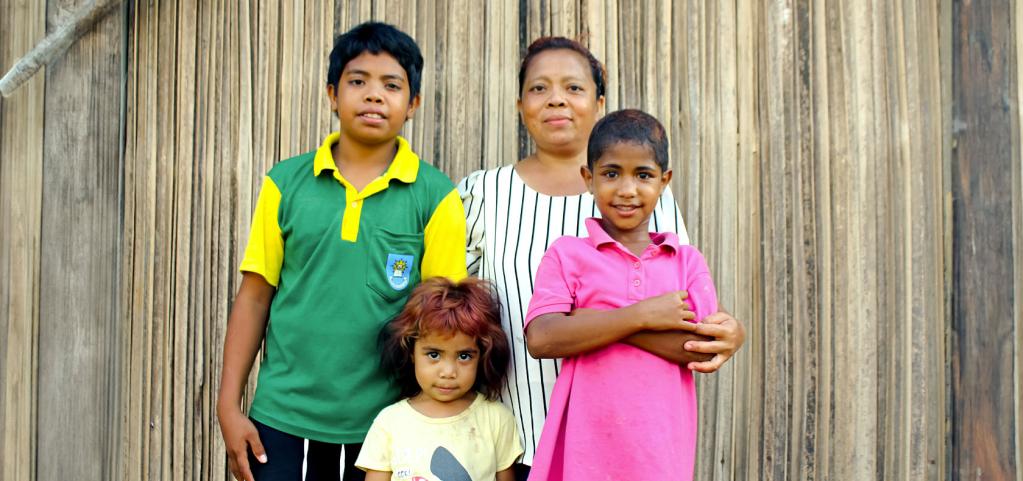
Story
06 February 2024
Reaching Timor-Leste’s zero-dose children, one household at a time
Yet, when healthcare workers conducting a house-to-house screening reached him, they found that he hadn’t received any routine vaccinations that would protect him from debilitating diseases like polio, measles, hepatitis among others.
Natazu’s parents were unaware that the health post next door, which functions erratically, also substitutes as a vaccination center often. For them, taking Natazu to the Community Health Centre (CHC) a few kilometres away would mean losing out on a workday. But thanks to the team of healthcare workers, Natazu received his first doses of the Oral Polio Vaccine (OPV), Measles and Rubella (MR) vaccine, Pneumococcal vaccine (PCV) and the Pentavalent vaccine providing protection from five life-threatening diseases – Diphtheria, Pertussis, Tetanus, Hepatitis B and Haemophilus influenzae type b (Hib), a few weeks after he was detected as a ‘zero dose’ child.
Armed with the necessary shots in a vaccine carrier, health workers from the Ministry of Health and immunization consultants appointed by the World Health Organization (WHO) traverse difficult terrains to reach communities in remotest parts of Timor-Leste to ensure that children like Natazu are not left behind.
Health workers during a door to door sweeping activity in Suai, Timor-Leste. WHO Photo.
An estimated 8% to 9% children in Timor-Leste are ‘zero dose’, according to an Expanded Program on Immunization (EPI) survey conducted in 2023. While most of these cases are seen in the rural parts, the survey also highlighted a few cases in urban areas. Health care providers say that many of the zero dose children are delivered at home, and thus miss out on the birth doses under the routine immunization. Other reasons for zero dose and dropouts commonly include lack of awareness among parents and lack of willingness to travel to the health care centers, often located several kilometers away. Household visits by health care providers thus become crucial in reaching this population.
“The concentrated efforts by the health care providers on the ground, including the WHO’s immunization consultants have made significant improvements in reaching the zero dose and dropout children,” said Dr Arvind Mathur, WHO Representative to Timor-Leste. “These improvements reflect in the average coverage rate of various antigens in the country compared to the previous years.”
In Timor-Leste, vaccines have successfully eliminated smallpox in the 1980s and polio in the 1990s. The country eliminated maternal and neonatal tetanus in 2012, measles in 2018, and most recently rubella in 2023.
Health workers on the field in Manatuto municipality. WHO Photo/Emilia Moniz
Over the years, numerous immunization campaigns have been conducted as catch up and supplementary immunization drives in the country. In 2015, the country launched a national measles, rubella and polio immunization campaign aiming to reach 500,000 children and committing to achieve over 90 per cent immunization coverage.
The routine immunization programme suffered severe disruptions due to the COVID-19 pandemic. To bridge the gap caused by the disruptions, Timor-Leste, with support from partners like WHO and UNICEF, rolled out an integrated immunization campaign in January 2023. This campaign included essential vaccines such as MR, OPV, PCV, along with Vitamin A supplements, deworming (Albendazole) tablets for children below 5 years, and COVID-19 vaccines for those above 12 years and achieved 95% coverage in a month.
In May 2023, UNICEF and the Government of Australia, signed a $2.7 million agreement to further strengthen EPI in Timor-Leste.
Recognizing the need to strengthen the capabilities of local public health officers, several training sessions were conducted across the country. The sessions focused on enhancing knowledge and skills in immunization practices, vaccine management, data collection and updating them with latest immunization strategies for actively tracking zero dose children through community engagement. These trainings, led by the WHO consultants and local EPI focal points, also included practical scenarios and hands-on exercises.
A WHO immunization consultant inspects the cold chain. WHO Photo.
“Our understanding about cold chain maintenance, microplanning to reach more households, conducting Rapid Convenience Assessment (RCA), has improved tremendously,” said Domingos Tavares (47), an EPI focal person for the Manufahi municipality of Timor-Leste. “Having the WHO immunization consultant on the ground has helped the field staff to constantly learn and implement the learnings,” he said.
Domingos added that difficult roads, bad infrastructure, and insufficient field staff, continue to pose challenges to the immunization program.
1 of 5
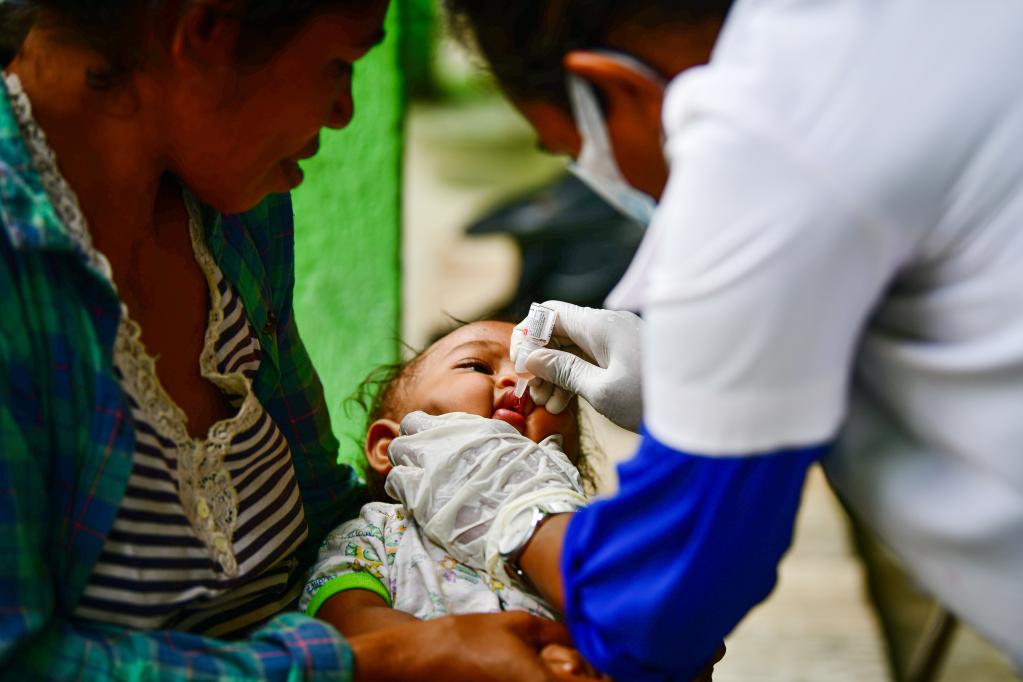
Story
17 October 2023
Baucau gets a new centre for cervical cancer screening and management
This centre boasts a comprehensive range of services, including Visual Inspection with Acetic Acid (VIA) screening, a colposcopy machine, and the capability to perform thermal ablation procedures for early-stage cancers and precancerous lesions.
Visual Inspection with Acetic Acid (VIA) is a simple and non-invasive examination of the cervix, expertly conducted by healthcare professionals after the application of diluted acetic acid. If a pre-cancerous or cancerous lesion be suspected, a colposcopy procedure is recommended. Colposcopy involves a thorough examination of the cervix, aided by a specialized microscope equipped with a light source (colposcope).
This newly established centre marks Timor-Leste's second dedicated facility for cervical cancer screening and management. The first centre was inaugurated at the national hospital (HNGV) in May 2022. Since its inception, the colposcopy clinic at the HNGV has provided cervical cancer screening services to more than 320 women and performed colposcopy for over 20 women.
Cervical cancer is preventable and curable if detected early and treated adequately. And yet, it is one of the most common causes of cancer related death among women globally as well as in Timor-Leste.
It is estimated that in the country, annually 10 cases of cervical cancer occur for 100,000 women and 6 women die per 100,000 women due to cervical cancer. This also indicates that around 60% of diagnosed cases are advanced cases. WHO has been actively working with the Ministry of Health in Timor-Leste for improving the health and well-being of women and families and strengthening diagnostics for the community.
1 of 5
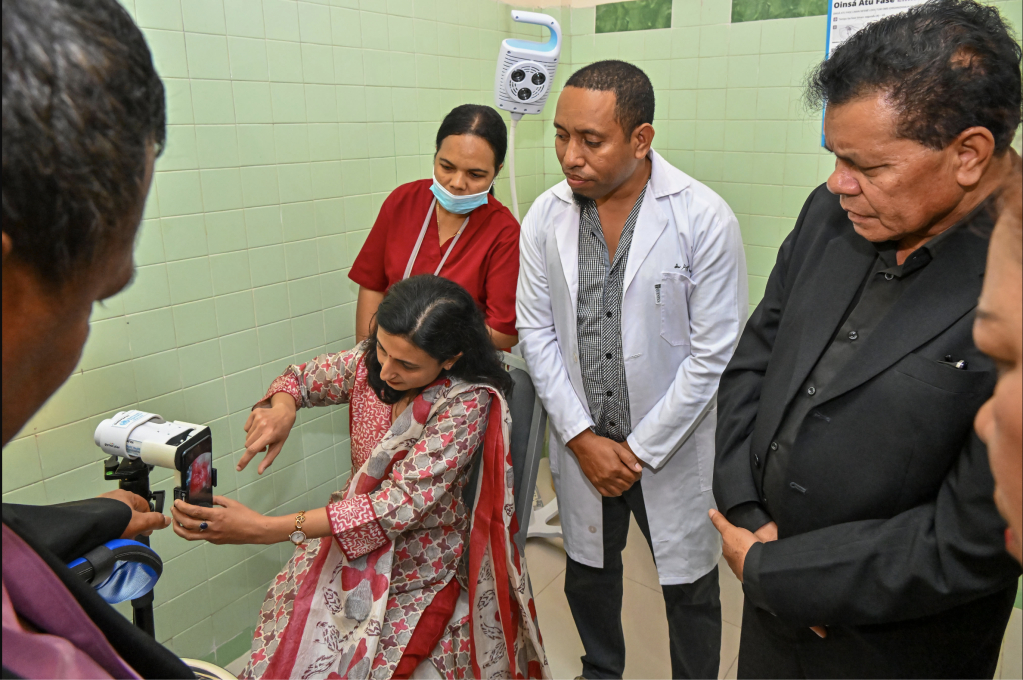
Story
17 October 2023
Baucau's Tirilolo Hospital takes first steps to become a climate-resilient facility
A solar power system has been installed to support the Simulation Skills Centre at the hospital and the premises now has an eco-friendly water treatment plant.
The solar panels can generate 21.2 kilowatts of power and are fortified by advanced lithium batteries, ensuring long-term efficiency and uninterrupted operation. The panels are designed to withstand wind loads of up to 2400 pascal.
This initiative of the Ministry of Health in collaboration with WHO is focused on showcasing how healthcare facilities can reduce their carbon footprint and greenhouse gas emissions by embracing clean energy solutions. Additionally, this approach will strengthen the hospital's capability to safeguard and enhance the well-being of their target communities through environmentally sustainable and climate-resilient methods.
Recognizing the paramount importance of safe, clean water in healthcare settings, the hospital has also introduced a water treatment plant. Utilizing ultrafiltration technology, this fully automated plant can produce 4,000 liters of purified water per hour. Its modular and self-contained design ensures ease of transport and maneuverability, allowing for adaptability to meet the evolving needs of the hospital and its patients.
By embracing clean energy and ensuring access to safe water, the hospital is not only redefining healthcare standards but also setting a precedent for a healthier, greener future.
1 of 5
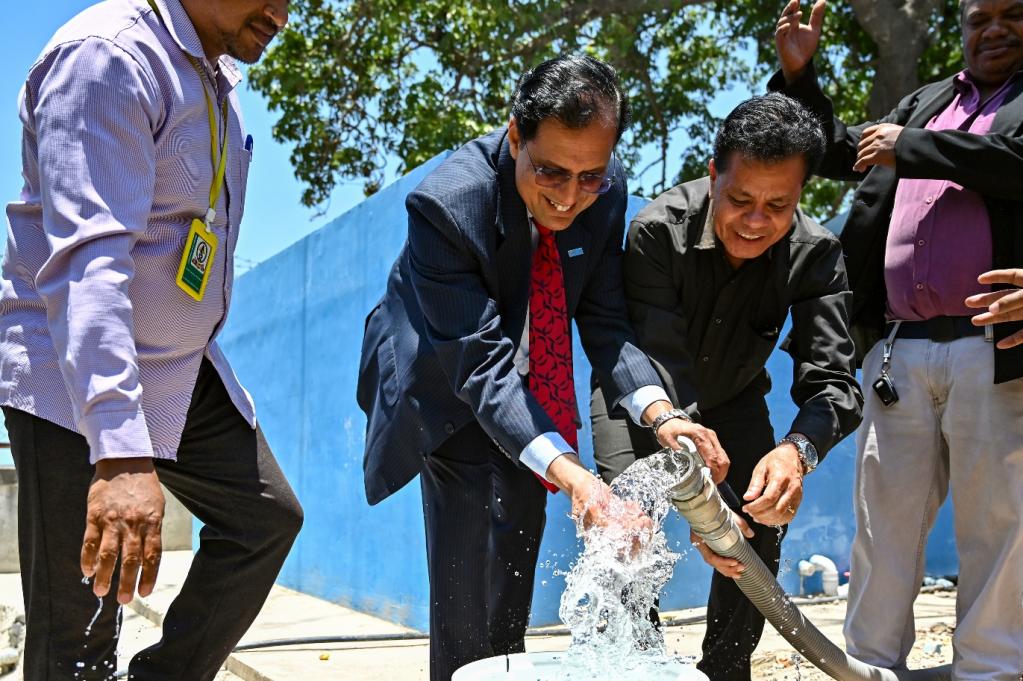
Press Release
08 February 2024
UN Secretary-General’s Special Envoy for Road Safety mission in Timor-Leste (8 -10 February 2024) to call for accrued mobilization for safer mobility.
The new World Health Organization (WHO) Global status report on road safety 2023, highlights that 28% of all road traffic fatalities occur in South-East Asia. The Region reported 16.1 deaths per 100 000 population due to road traffic crashes, three times higher than the European average of 5/100,000 (WHO 2023).
According to the World Health Organization, the mortality rate in Timor-Leste is 12 per 100,000 inhabitants (WHO 2023). The country saw a 25% decline in fatalities since 2018 (WHO 2023), but road crashes still represent one of the main cause of fatalities in the country, especially among the young generations and men (WHO 2019).
“Despite progress in the region, road crashes remain the main killers of kids worldwide, so it is time to act to protect the most vulnerable on the road. Going to Timor-Leste, my role, as UN Secretary-General's Special Envoy for Road safety, is to support President José Manuel Ramos-Horta, his government, and stakeholders in their work to build safer and sustainable roads for all », highlights the Special Envoy.
Road crashes are a public health issue…
In Timor-Leste, there are still important areas to work on to improve road safety, such as limiting the speed at 30KM/h in urban areas or around schools, offering the population safe alternatives to motorized vehicles, or promoting the use of helmets responding to the UN minimum safety standards, which can reduce the risk of brain injury in case of crash by up to 74%. Timor-Leste is also highly vulnerable to natural hazards, which contribute to damage an already strained road infrastructure. In addition, the last full traffic survey in the country dates back 10 years, making precise planning difficult due to the lack of accurate data.
… and an economic and development issue
Poor road safety conditions affect the world's poorest people the most, especially women and youth, and deprive them of access to education, work, health, basic and cultural services. In that perspective, the UN system supported the Government of Timor-Leste in the establishment and rehabilitation of approximately 320 km of rural roads in 2021 (UN Timor-Leste 2022 Annual Report). This rehabilitation provided economic opportunities, access to markets, and social services to more than 17,000 individuals living in rural areas.
In addition to the human tragedy, road crashes trap countries into a vicious circle of poverty. Some estimates put the global macroeconomic cost of road traffic injuries as high as US$ $1.8 trillion (WHO 2023). According to the World Bank, the cost of road crashes represents 4,4 % of GDP (WB 2016) in Timor-Leste.
---------------------
Media Contact:
Secretariat of the UN Secretary-General's Special Envoy for Road Safety:
Priti Gautam priti.gautam@un.org
Stephanie Schumacher stephanie.schumacher@un.org
-----------------
Notes to Editors:
The United Nations has invested significantly in tackling the problem of road safety globally. Following the “Decade of Action for Road Safety 2011-2020”, the UN General Assembly in August 2020 adopted a resolution on “Improving Road Safety”, that reconfirmed its commitment to halving the number of global traffic deaths and injuries and to providing access to safe, affordable, accessible, and sustainable transport systems for all by 2030. In October 2021, the World Health Organization and the United Nations Regional Commissions, in cooperation with partners in the United Nations Road Safety Collaboration and other stakeholders, developed the Global Plan for the Decade of Action for Road Safety 2021-2030, as a guiding document to support the implementation of the Decade of Action 2021–2030 and its objectives.
In July 2022, the road safety community met in New York City for the first ever High-Level Meeting on Improving Global Road Safety at the United Nations General Assembly, unanimously adopting a text titled: “Political declaration of the high-level meeting on improving global road safety”.
To galvanize intersectoral actions and raise the visibility of road safety, the UN Secretary-General, Ban Ki-moon, appointed in 2015 Jean Todt as his Special Envoy for Road Safety. He was reconfirmed in this role by the new UN Secretary-General, António Guterres, in 2017 and in 2021. In 2018, together with 14 UN organizations, the Special Envoy launched the UN Road Safety Fund (UNRSF). In his role as UN Special Envoy, Mr. Todt contributes, among other things, to mobilize sustained political commitment to make road safety a priority; to advocate and raise awareness of UN legal instruments on road safety; to share established good practices in this area; to striving to generate adequate funding through strategic partnerships between the public, private and non-governmental sectors.
Special Envoy brochure and Twitter account.
UNECE acts as the secretariat for the Special Envoy for Road Safety. UNECE is the custodian of the United Nations road safety legal instruments applicable worldwide, such as the Convention on Road Traffic, the Convention on Road Signs and Signals, and the 1958, 1997 and 1998 Vehicle Regulations Agreements. UNECE services the ECOSOC Committee of Experts on Transport of Dangerous Goods, as well as the only permanent United Nations intergovernmental forum on road safety (Working Party on Road Traffic Safety) and the World Forum for Harmonization of Vehicle Regulations, both in the framework of the Inland Transport Committee, which is the only permanent UN forum specialized in inland modes of transport.
1 of 5
Press Release
02 February 2024
UN Allocates US$2 Million to Respond to El Niño Impacts in Timor-Leste
The rapid response grant is part of the United Nations Central Emergency Response Fund (CERF) and will be implemented through three UN agencies: the Food and Agriculture Organization (FAO), United Nations Children’s Fund, (UNICEF), and the World Food Programme (WFP). "The grant will directly support 45,000 individuals and benefit an additional 241,000 people facing acute food and nutrition insecurity, water scarcity, and lean crop yields."
The grant covers six municipalities, ranging from Lautem in the east to Bobonaro on the western border, including Liquica, Ermera, Manufahi, and Covalima. These areas are among those with the highest rates of child stunting and food insecurity.
Over the next six months, the grant will provide essential foods, including rice, pulses, and oil, ensure access to clean water, and support farmers with drought-resistant seeds, livestock vaccines, and home gardening inputs. Over 1,000 pregnant and breastfeeding women will receive special nutritious food to prevent malnutrition. Additionally, 55,000 children aged 0-5 years will be screened, and those requiring treatment will receive care for severe acute malnutrition.
Announcing the grant, UN Resident Coordinator in Timor-Leste Funmi Balogun remarked, "The CERF grant embodies the United Nations contribution to Timor-Leste’s El Niño mitigation efforts. It is a strategic intervention designed to offer immediate relief to vulnerable households, including pregnant and breastfeeding women, as well as farmers, ensuring they receive the necessary support to withstand the negative impacts of El Niño.”
As a small island nation, Timor-Leste relies heavily on rain-fed agriculture and imported food. Since September 2023, an ongoing El Niño weather event has led to drought-like conditions, delayed rainfall, and flash floods during the country’s main planting season. This disruption has affected crop production and agricultural income, significantly impacting food access and availability for many vulnerable people in rural areas.
The CERF allocation will not only support vital short-term interventions and highlight ongoing vulnerabilities in these municipalities but also align with the United Nations Strategic Development Cooperation Framework. It aims to support the Government of Timor-Leste in targeting their development activities more effectively and achieving the Sustainable Development Goals in the country.
-END-
Notes to Editors:
The United Nations Central Emergency Response Fund (CERF) is one of the fastest and most effective ways to ensure urgently needed humanitarian assistance reaches people caught up in crises. Established by the United Nations General Assembly in 2005 as the global emergency response fund, CERF enables humanitarian responders to deliver life-saving assistance whenever and wherever crises strike.
In Timor-Leste, the CERF allocation aims to prevent or reduce the negative impacts of the anticipated drought due to El Niño and meet the most urgent anticipated food and WASH needs of communities projected to be most at-risk. The El Niño weather event is expected to significantly reduce rainfall from November 2023, with drought anticipated in early 2024. This will intensify food insecurity, acute water scarcity, and malnutrition, expected to worsen from March to April 2024. Even before the El Niño event, 44 percent of families already faced severe and moderate food insecurity, with 54 percent of households experiencing water scarcity at least once in a 6-month period. In some municipalities, this figure rises as high as 70 percent (2022 National Census; Food Security Assessment, WFP, 2023). With one of the highest rates of stunting in the world at 47 percent, and given the supply and demand dynamics affecting both availability and affordability of food, there is an urgent need to mitigate the complete deterioration of food security as El Niño is expected to exacerbate already concerning food security conditions.
For more information, contact:
- Imogen Wilson (WFP): imogen.wilson@wfp.org
- Pedro Soares (FAO): Pedro.Soares@fao.org
- Tapuwa Mutseyekwa (UNICEF): tmutseyekwa@unicef.org
- Ahmed Saleem (UN RCO): mohammed.saleem@un.org
1 of 5
Press Release
02 February 2024
UN aloka osan dolar amerikanu millaun 2 atu responde ba impaktu El Nino iha Timor-Leste
Fundu resposta lalais ne'e hanesan parte husi Fundu Sentral Nasoins Unidas nian ba Resposta Emerjensia (CERF) no sei implementa liuhusi ajénsia tolu ONU nian: Organizasaun Ai-han no Agrikultura (FAO), UNICEF no Programa Ai-han Mundial (WFP). "Ofisial ne'e sei fó apoiu direta ba ema na'in 45,000 no sei fó benefísiu ba ema na'in 241,000 tan ne'ebé hasoru inseguransa ai-han no nutrisaun ne'ebé aat, falta bee, no produtu ai-horis ne'ebé ki'ik."
Fundu ne'e kobre munisípiu neen, hahú husi Lautem iha parte leste to'o Bobonaro iha fronteira oeste, inklui Liquica, Ermera, Manufahi no Covalima. Iha área hirak-ne'e mak entre sira ne'ebé iha númeru aas liu husi labarik sira ne'ebé hetan inseguransa hahán.
Iha fulan neen oin mai, subsídiu ne'e sei fornese ai-han esensiál sira, inklui foos, pulsu no mina, asegura asesu ba bee moos, no suporta agrikultór sira ho fini rezistente ba rai-rahun, vasina ba animál sira, no inputs jardín uma-laran. Feto isin-rua no fó-susu liu 1,000 sei simu ai-han nutritivu espesiál atu prevene malnutrisaun. Aleinde ne'e, sei halo monitorizasaun ba labarik na'in 55,000 ho idade tinan 0-5, no sira ne'ebé presiza.
Anunsia kontribuisaun ne'e, Koordenador Rezidente Nasoins Unidas nian iha Timor-Leste Funmi Balogun hateten: "Funsaun CERF nian inklui kontribuisaun Nasoins Unidas nian ba esforsu mitigasaun El Nino Timor-Leste nian. Ida ne'e hanesan intervensaun estratéjika ida-ne'ebé dezeña atu oferese asisténsia imediata ba uma-kain sira ne'ebé vulneravel, inklui feto isin-rua no fó-susu, nune'e mós agrikultór sira, hodi asegura katak sira simu apoiu nesesáriu hodi tahan impaktu negativu husi El Nino."
Nu'udar nasaun illa ki'ik ida, Timor-Leste depende maka'as ba agrikultura ne'ebé udan-been no ai-han importadu. Hahú husi fulan Setembru tinan 2023, eventu tempu El Nino ne'ebé la'o hela hamosu kondisaun hanesan rai-rahun, udan-been ne'ebé tarde ona, no inundasaun flash durante tempu kuda-rai nian. Disrupsaun ida-ne'e afeta ona produsaun ai-horis no rendimentu agríkola, ne'ebé fó impaktu signifikativu ba asesu ai-han no disponibilidade ba ema vulneravel barak iha área rurál sira.
Alokasaun CERF la'ós de'it sei apoia intervensaun importante sira iha tempu badak no sei hatudu vulnerabilidade sira ne'ebé la'o hela iha munisípiu hirak-ne'e maibé mós sei aliña ho Kuadru Estratejiku Nasoins Unidas nian ba Dezenvolvimentu. Objetivu husi programa ne'e mak atu fó apoiu ba Governu Timor-Leste hodi alkansa sira-nia atividade dezenvolvimentu ho efetivu no atinji Objetivu sira Dezenvolvimentu Sustentavel iha nasaun ne'e.
Notes to Editors:
The United Nations Central Emergency Response Fund (CERF) is one of the fastest and most effective ways to ensure urgently needed humanitarian assistance reaches people caught up in crises. Established by the United Nations General Assembly in 2005 as the global emergency response fund, CERF enables humanitarian responders to deliver life-saving assistance whenever and wherever crises strike.
In Timor-Leste, the CERF allocation aims to prevent or reduce the negative impacts of the anticipated drought due to El Niño and meet the most urgent anticipated food and WASH needs of communities projected to be most at-risk. The El Niño weather event is expected to significantly reduce rainfall from November 2023, with drought anticipated in early 2024. This will intensify food insecurity, acute water scarcity, and malnutrition, expected to worsen from March to April 2024. Even before the El Niño event, 44 percent of families already faced severe and moderate food insecurity, with 54 percent of households experiencing water scarcity at least once in a 6-month period. In some municipalities, this figure rises as high as 70 percent (2022 National Census; Food Security Assessment, WFP, 2023). With one of the highest rates of stunting in the world at 47 percent, and given the supply and demand dynamics affecting both availability and affordability of food, there is an urgent need to mitigate the complete deterioration of food security as El Niño is expected to exacerbate already concerning food security conditions.
For more information, contact:
- Imogen Wilson (WFP): imogen.wilson@wfp.org
- Pedro Soares (FAO): Pedro.Soares@fao.org
- Tapuwa Mutseyekwa (UNICEF): tmutseyekwa@unicef.org
- Ahmed Saleem (UN RCO): mohammed.saleem@un.org
1 of 5
Press Release
17 October 2023
Timor-Leste’s first state of art simulation skills centre opens in Baucau
In addition to the simulation skills centre in Baucau, three more centres will come up in Dili, and one each at the referral hospitals at Maubesse, Maliana, Suai and Oecussi.
Traditional medical and nursing education has relied heavily on training with real patients in clinical settings, where mistakes can pose a significant concern for patient safety. Simulation skills centres offer safe practice place for students and professionals by bridging the gap between classroom instruction and real clinical practice, while reducing the risks associated with learning on real patients.
Simulation is highly effective for developing skills in procedures requiring eye-hand coordination and ambidextrous (two-handed) maneuvers, helping learners prepare for unexpected medical events. Healthcare simulations serve four primary purposes: education, assessment, research, and integration into the healthcare system, ultimately enhancing patient safety.
Mr. José dos Reis Magno, Vice Health Minister of Timor-Leste thanked WHO for the continuous support to the Ministry of Health. “This facility is crucial for strengthening the health sector in Timor-Leste and reducing overall morbidity and mortality in the country,” he said during the inauguration event.
Timor-Leste currently faces a shortage of skilled and competent human resources, with only 25 healthcare professionals per 10,000 population, significantly below the global Human Resources for Health (HRH) strategy goal of 44.5 per 10,000. The competency and confidence in critical care and emergency management is also limited. The establishment of simulation skills centers will result in improved quality health services for more than 1.3 million people, bringing Timor-Leste closer to achieving its goal of comprehensive, equitable, and accessible healthcare services.
"Simulation facilities are a vital component in advancing healthcare education, ensuring professionals are well-prepared for the challenges they may encounter,” said Dr Arvind Mathur, WHO Representative to Timor-Leste. “By launching this center and expanding the concept to other locations, we are taking a substantial step toward improving healthcare delivery and patient safety in Timor-Leste,” he said.
For more information, contact:
Jyoti Shelar, Communications Consultant, WHO: [email protected]; +67077728051
1 of 5
Press Release
07 September 2023
UN Population Fund Goodwill Ambassador, Catarina Furtado, visits Timor-Leste to support maternal health, gender equality and human rights
Since being appointed as a Goodwill Ambassador in 2000, Catarina Furtado has traversed the world to visit UNFPA programmes – highlighting essential needs and rights of women and girls. This is her third visit to Timor-Leste and her second as UNFPA Goodwill Ambassador.
“We are very pleased and honored to welcome Catarina Furtado here in Dili. She is a global champion of women and girls and a sexual and reproductive rights advocate. Her work has greatly impacted women and girls around the world,” said Pressia Arifin-Cabo, Country Representative for the UN Population Fund in Timor-Leste.
As a renowned TV personality and filmmaker in Portugal, Catarina uses her platforms to share stories about sexual and reproductive rights and prevention of gender-based violence (GBV) and other harmful practices focusing on women and girls, in Portugal and to global audiences.
She is well known for her television documentary series, Príncipes do Nada, that introduced audiences to issues ranging from maternal health to adolescent pregnancy. Through her charity organization, Corações Com Coroa, founded ten years ago, she advocates for the prevention of GBV and empowering women and girls in Portugal.
While in Timor-Leste, Catarina Furtado will visit maternal health projects that were a result of a strong collaboration between the UN Population Fund and the Government of Timor-Leste. She will visit a Basic Emergency Obstetric and Newborn Care (BEmONC) center that are critical to end maternal and infant deaths in Timor-Leste, witness various efforts to raise awareness and prevent HIV and other sexually transmitted infections (STIs) and the progress towards ending stigma and discrimination towards People Living With HIV in the country. She will also observe the strengthening of a multi-sectoral approach to the prevention of and response to gender-based violence (GBV).
Catarina Furtado’s visit aims to raise awareness on the urgency of preventing maternal deaths and gender-based violence in Timor Leste and across the globe by 2030, in line with the UNFPA Transformative Agenda.
For more information, contact:
Suleiman Okoth
Communications and Programme Support Specialist
United Nations Population Fund (UNFPA), Timor-Leste
Mobile: +67075169796, Email; okoth@unfpa.org
1 of 5
Latest Resources
1 / 11
Resources
26 October 2022
Resources
20 September 2022
Resources
06 September 2022
Resources
06 September 2022
1 / 11

